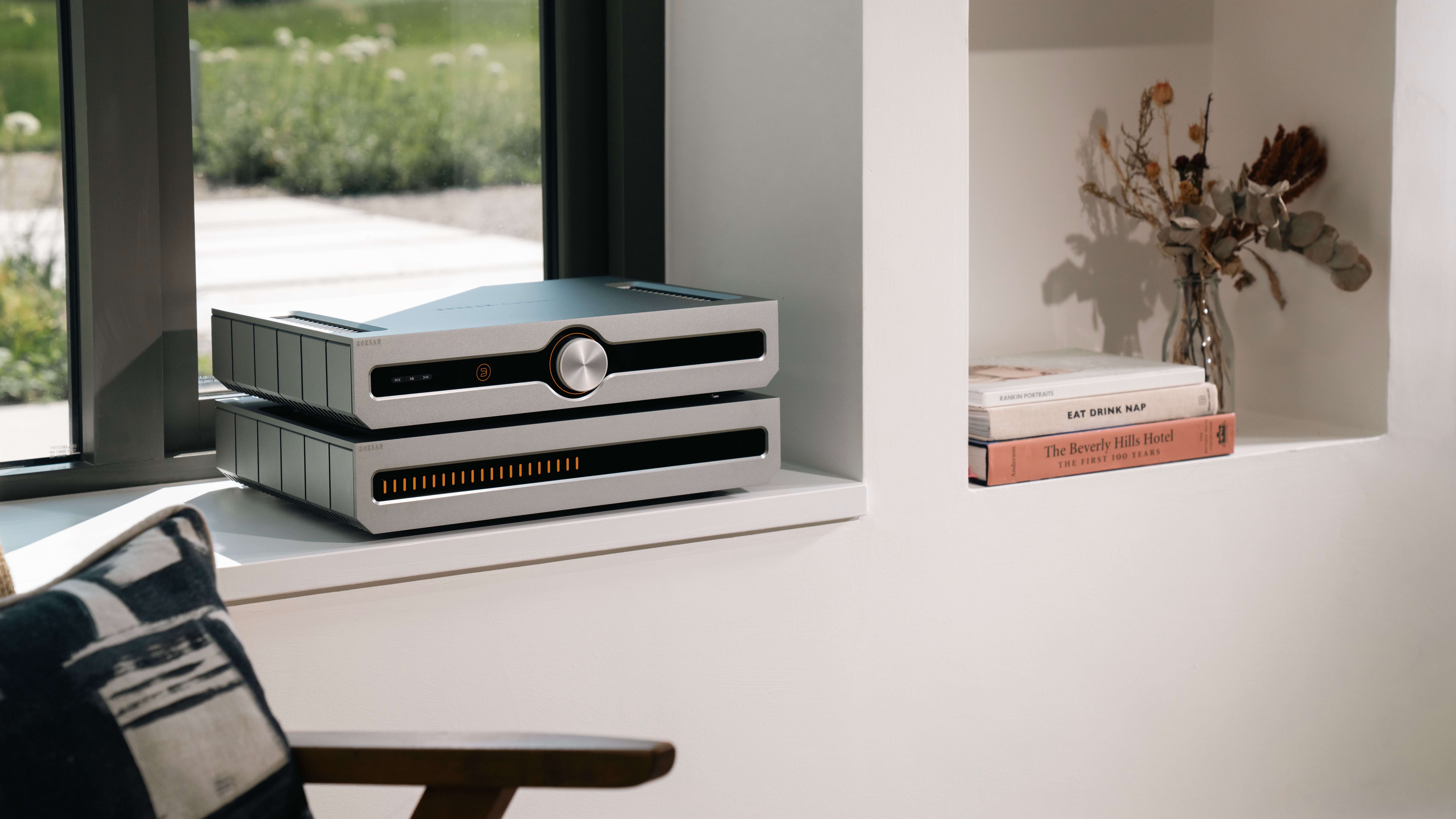Best Bluetooth speakers 2026: tried and tested for every budget
The best Bluetooth speakers for at-home and on-the-go
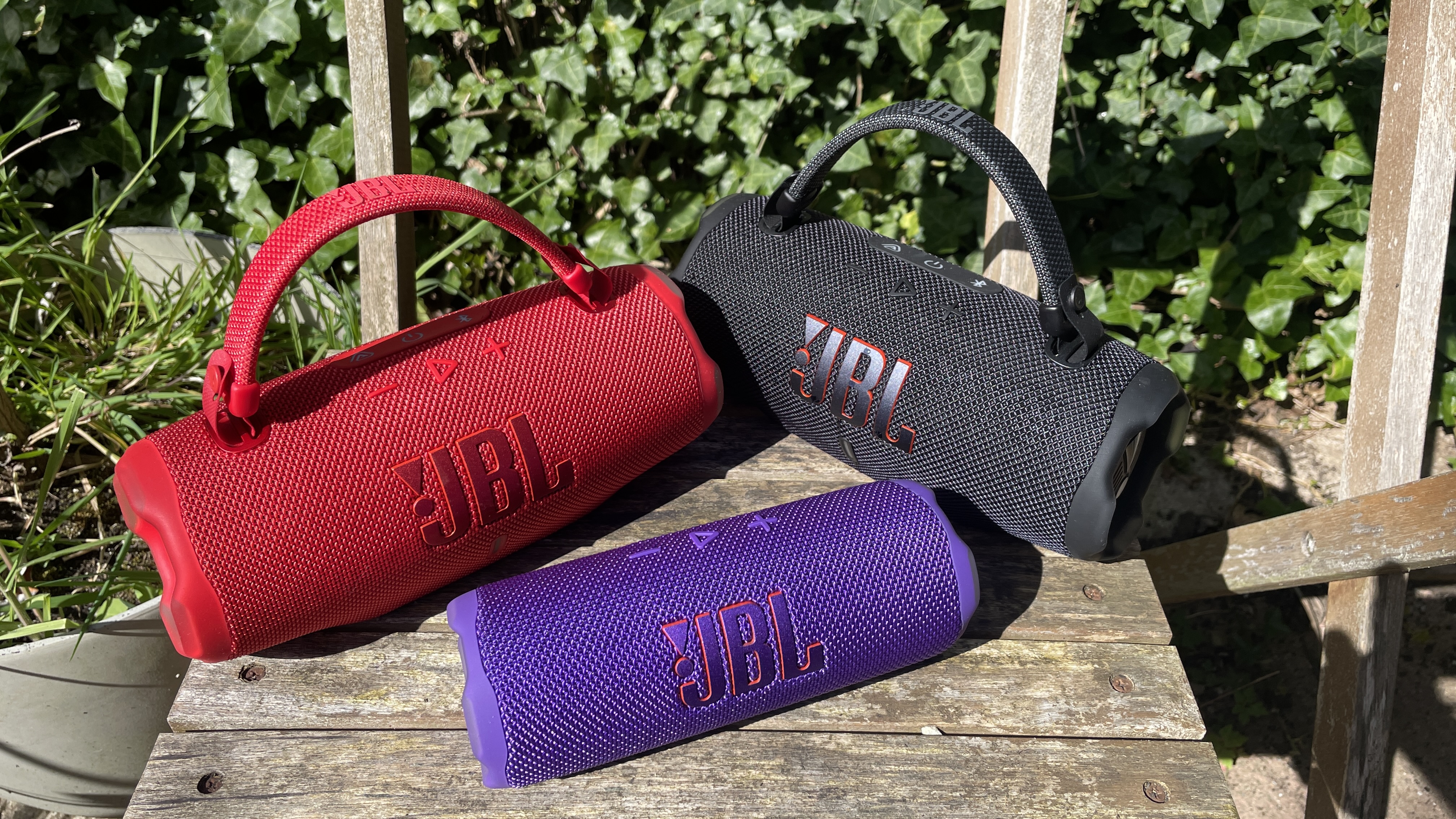
Bluetooth speakers come in all shapes, sizes and prices, and with varying discounts and deals intermittently thrown into the equation, it can be a nightmare trying to figure out which to choose.
At their best, they're one of the simplest ways to get your music playing wherever you are. The wire-free wonders can be stunningly versatile, from using one in your office to popping a compact model in a backpack and taking it to the park or up a mountainside.
The last few years have been massive for Bluetooth speakers, and we're expected big things in 2026. 2025 gave us the JBL Flip 7 and Charge 6, both of which debuted to great acclaim, while Bose added to its roster of SoundLink speakers with the likeable SoundLink Plus and SoundLink Micro (2nd Gen).
What could this year have in store? LG has already announced a host of additions to its will.i.am-tuned Xboom range, but what else could be arriving? Perhaps a sequel to the JBL Xtreme 4 or Go 4, or a a host of new goodies from Sonos? We haven't had an update to the Era series yet, and it's been around three years since that particular line arrived...
Whatever happens, we'll keep this page updated with the best and brightest talents on the scene. We'd encourage you to use this page to establish what a range of brilliant speakers can do across a healthy spectrum of prices and sizes to put you in a strong position to find your ideal companion.
Few categories enjoy such frequent deals and drops as Bluetooth speakers, and even when major sales events aren't taking place, so great savings are never far away. Keep your eyes on our deals hubs, best buys and spotlight deals if you're after the finest hardware at the best price possible.
Every entry on this list has been tested by our experts, both in our testing rooms and further afield, with our team assessing their sonic performance, feature sets, quality of build and general value.
You can learn more about our testing process or keep scrolling to see our pick of the best Bluetooth speakers available.
5th January: Happy New Year! We're keeping this page up to date as ever, as well as looking ahead to the speakers that could be arriving this year.

I'm a senior staff writer who has listened to and reviewed dozens of products during my time at What Hi-Fi?. Hi-fi loudspeakers and fancy amps are all well and good, but I love a great Bluetooth speaker that can offer a fast, fuss-free and often fantastically affordable solution to your everyday needs. I've had hands-on experience with every model on the list below, putting them through their paces to ensure you know exactly which speaker to go for. Good sound quality, durability, waterproofness (see our IP ratings explainer for details), features and connectivity; we've assessed them all to put you fully in the picture before buying.
Best Bluetooth speaker overall
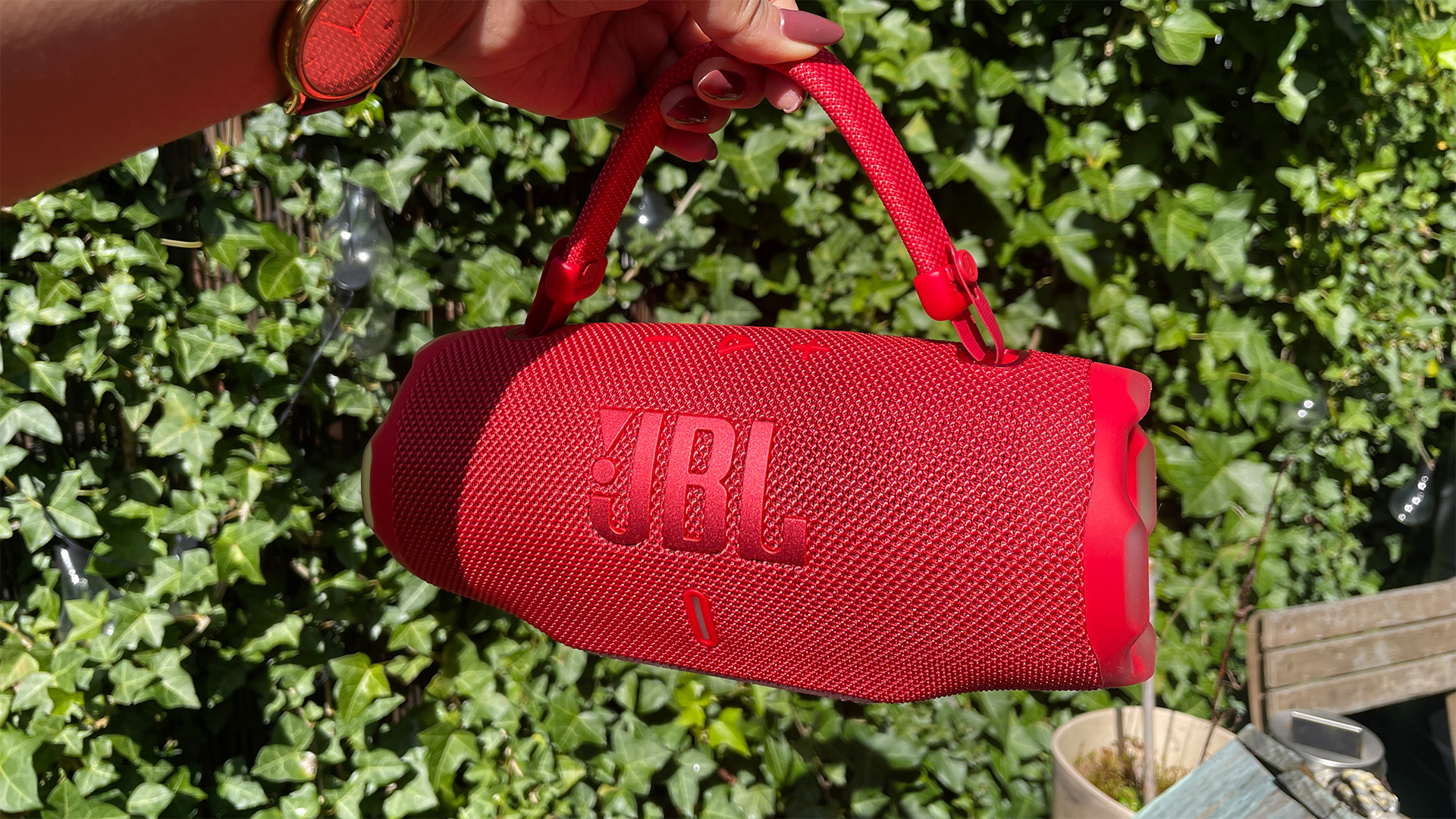
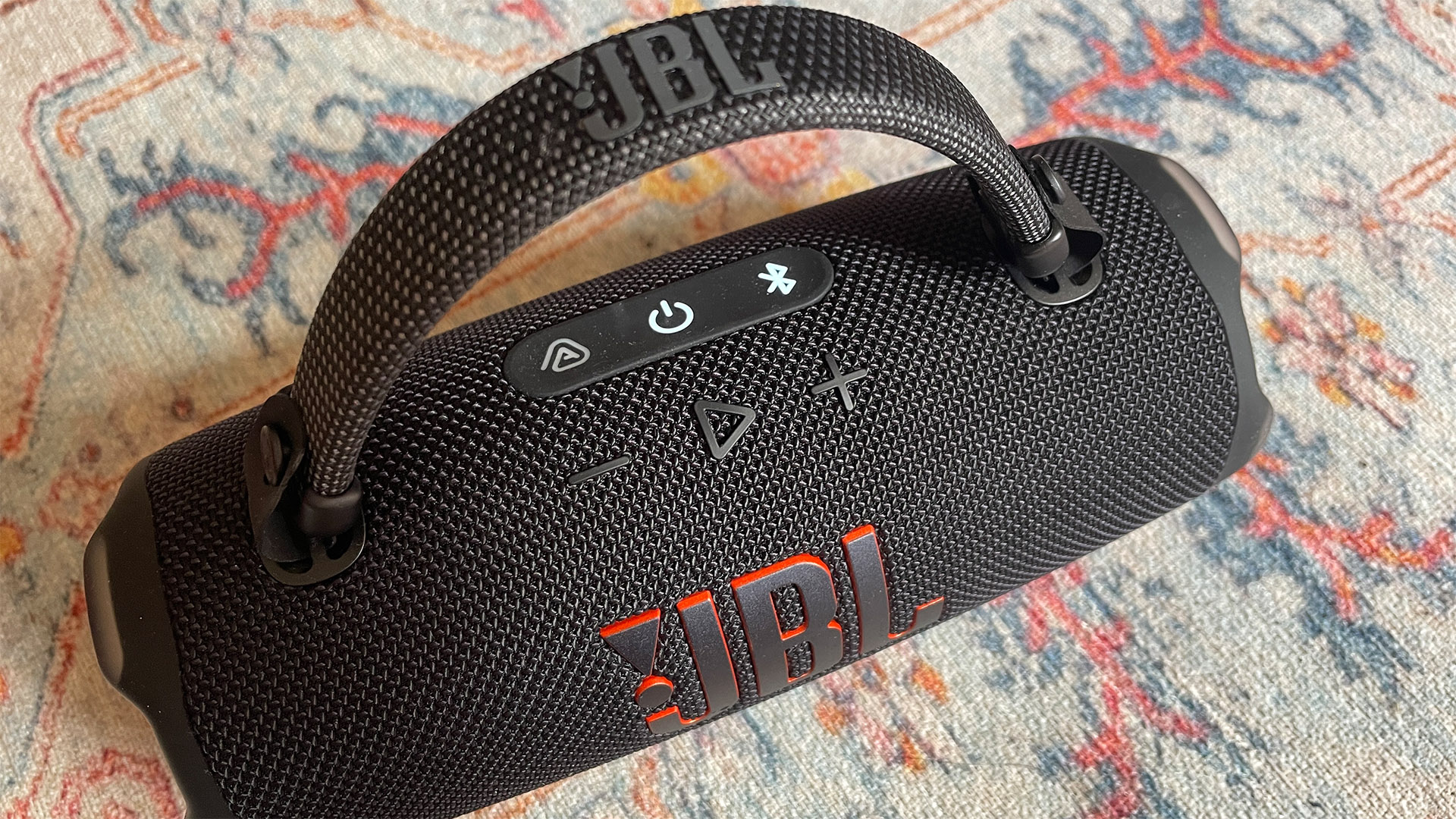
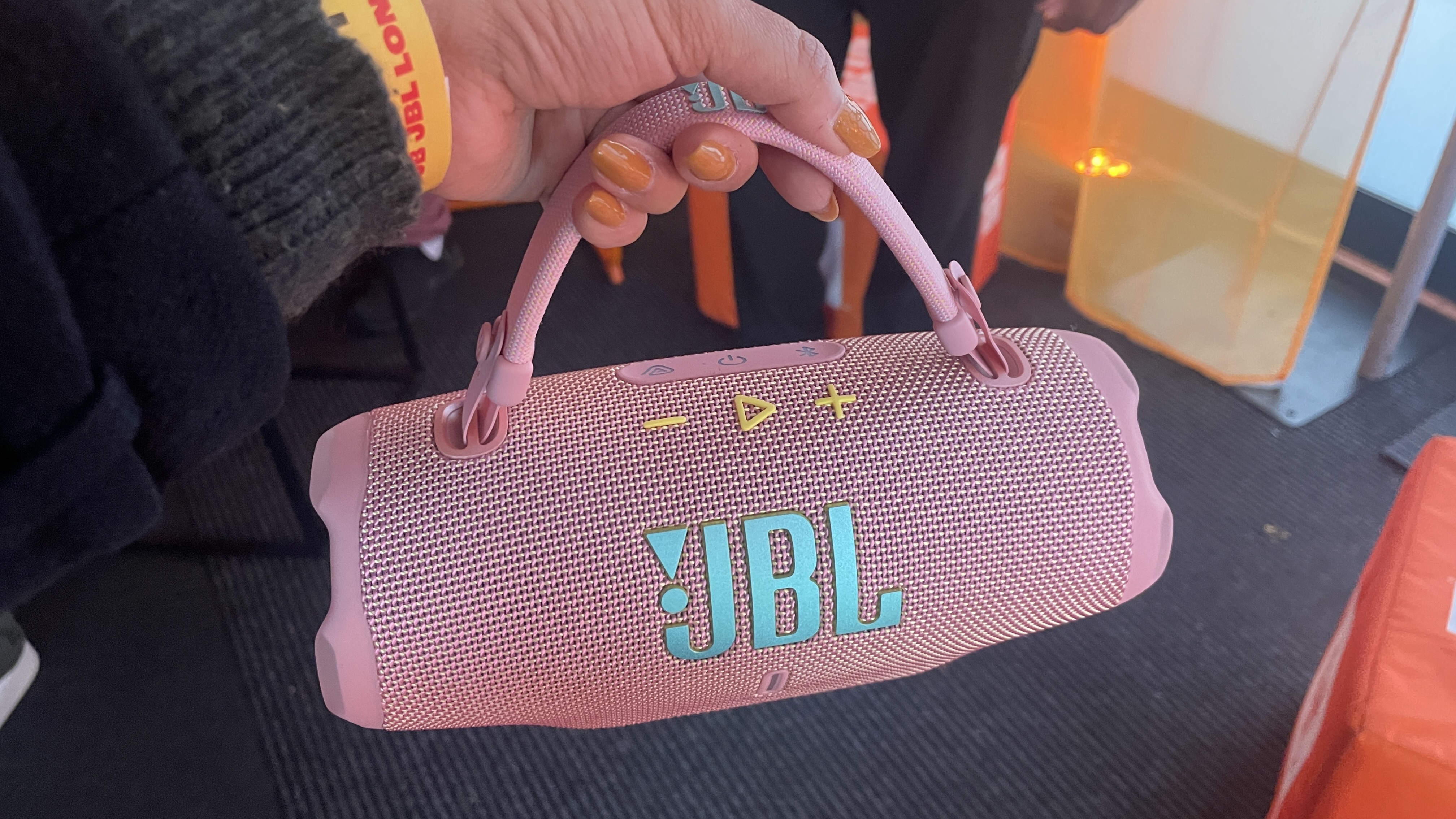
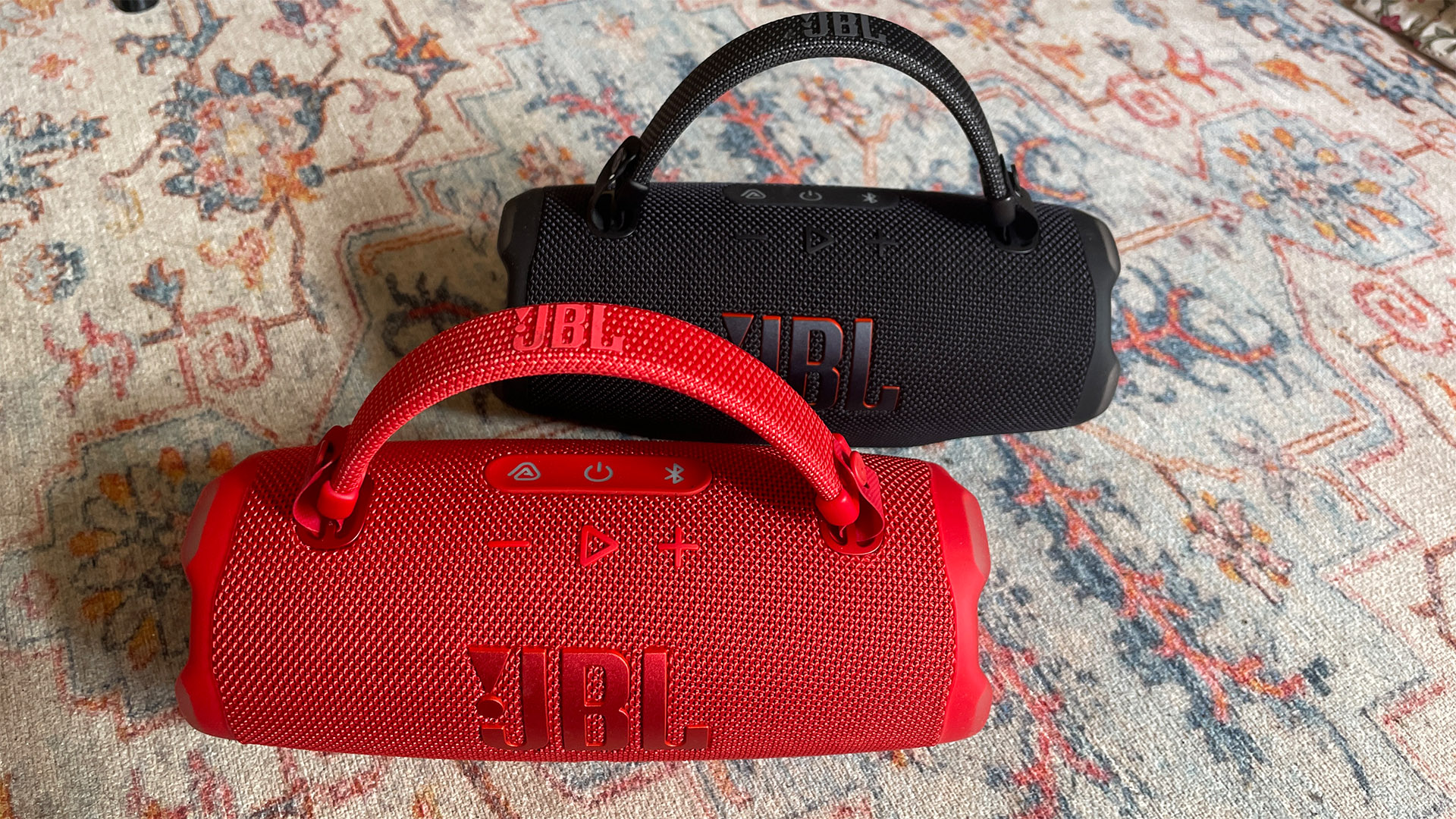
Specifications
Reasons to buy
Reasons to avoid
The JBL Charge 5 ended its run as one of the most enduringly impressive Bluetooth speakers we've ever tested, wowing us not only with the quality of its sound but also the longevity it continues to display.
After multiple What Hi-Fi? Award wins, JBL's bottle-shaped speaker is still on the market, but now that it's been succeeded by a sixth-generation model, it soon may ride off into the sunset as a bona fide legend.
As sad as that may be, the Charge 6 is ready to take up the mantle. It's now even more waterproof, dustproof and drop-proof than before, with an IP68 rating (up from the Charge 5’s IP67) and beefier bumper guards at either end of the speaker
Internally, the Charge 6 features a 20m tweeter and a newly developed woofer that strives for deeper and more powerful bass than the old model. Algorithm-led ‘AI Sound Boost’ analyses the speaker's sound in real time to optimise its output and ensure that a more powerful and exciting but less distorted sound is produced at all times and in all places.
It's paid off. To quote from our review: "The Charge 6 certainly sounds more powerful, but that muscle and authority are heard throughout the frequency range, not just in the lower end. The sound is clearer and more detailed than before, with vocals given extra solidity and textural depth; the highs soar with punch but clarity".
It doesn't stop there. JBL has made a concerted effort to make its latest generation of speakers as cutting-edge and feature-heavy as possible, packing its latest models with Auracast audio sharing and 24-bit/96kHz lossless audio via USB-C.
On top of those handy boons, the Charge 6 also offers 24 hours of juice plus four extra with Playtime Boost, as well as doubling up as a power bank for your smartphone or portable device.
Bose has a potential rival to the Charge 6 arriving soon in the shape of the Bose SoundLink Plus.
Costing a good deal more than the Charge 6 ( £250 / $269 / AU$429) but promising the same phone charging capabilities alongside an IP67 certification, around 12 hours of battery life and a "rich sound" with plenty of bass, it could certainly challenge JBL for supremacy and a place on this list.
Read our full JBL Charge 6 review

It's tempting to buy the newest and shiniest speakers on this list, but there's something to be said for being a little more savvy and considering the older models. The Charge 5, for instance, is often cheaper than the Flip 7 in the UK (£119 against £130), so if size and sound are more important than features and fashion, the older model might be the one to go for.
Best portable Bluetooth speaker
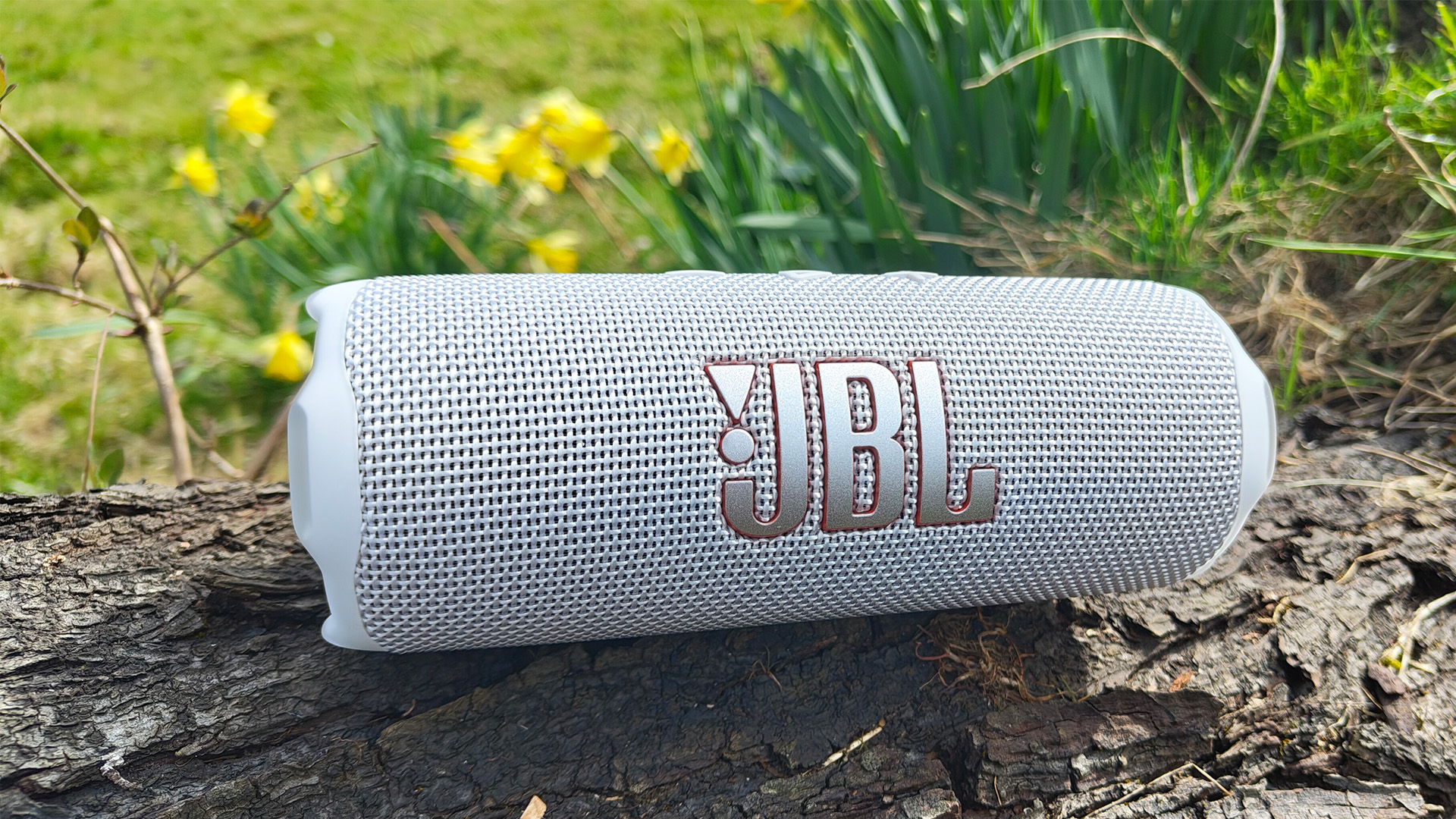
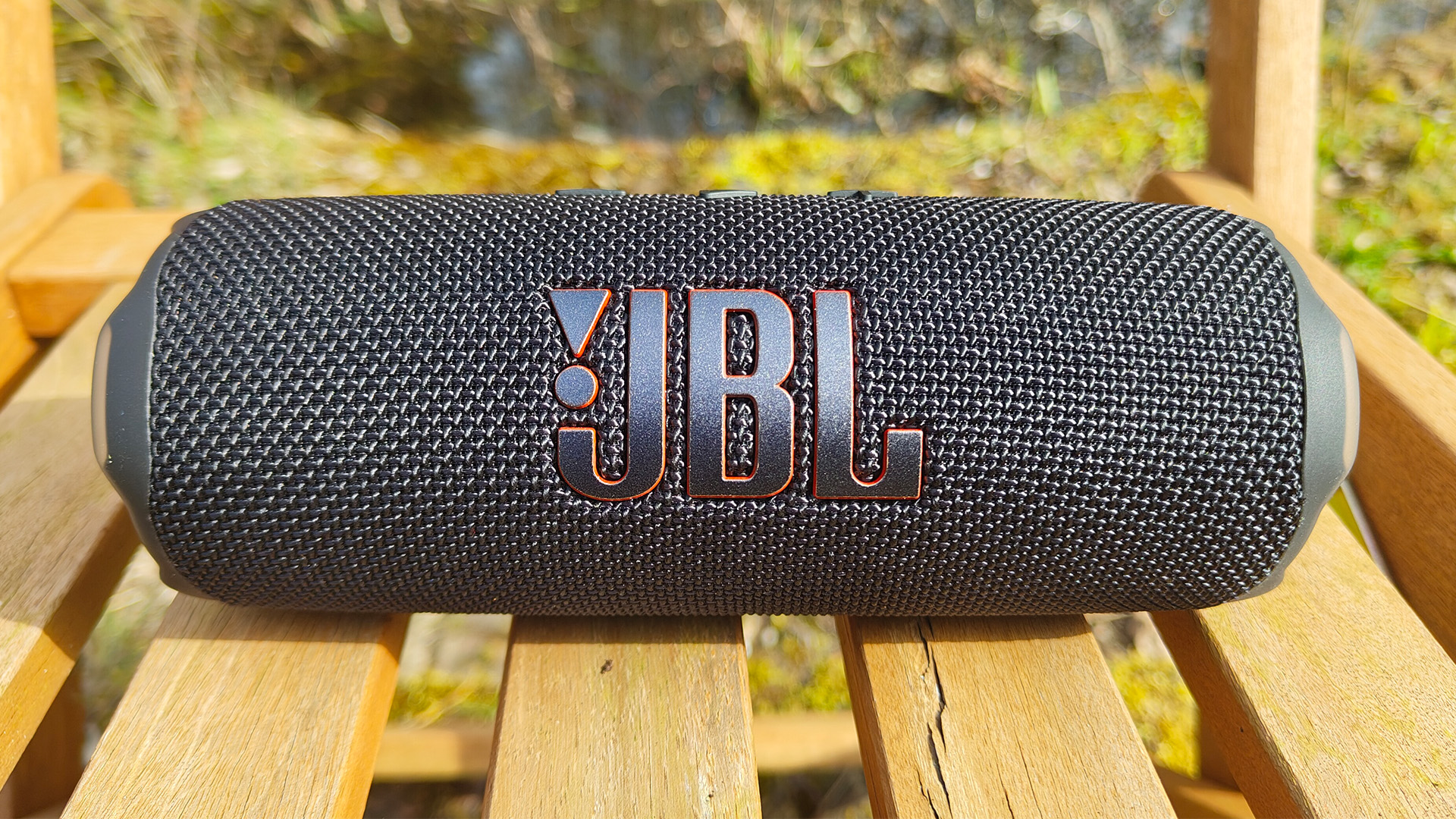
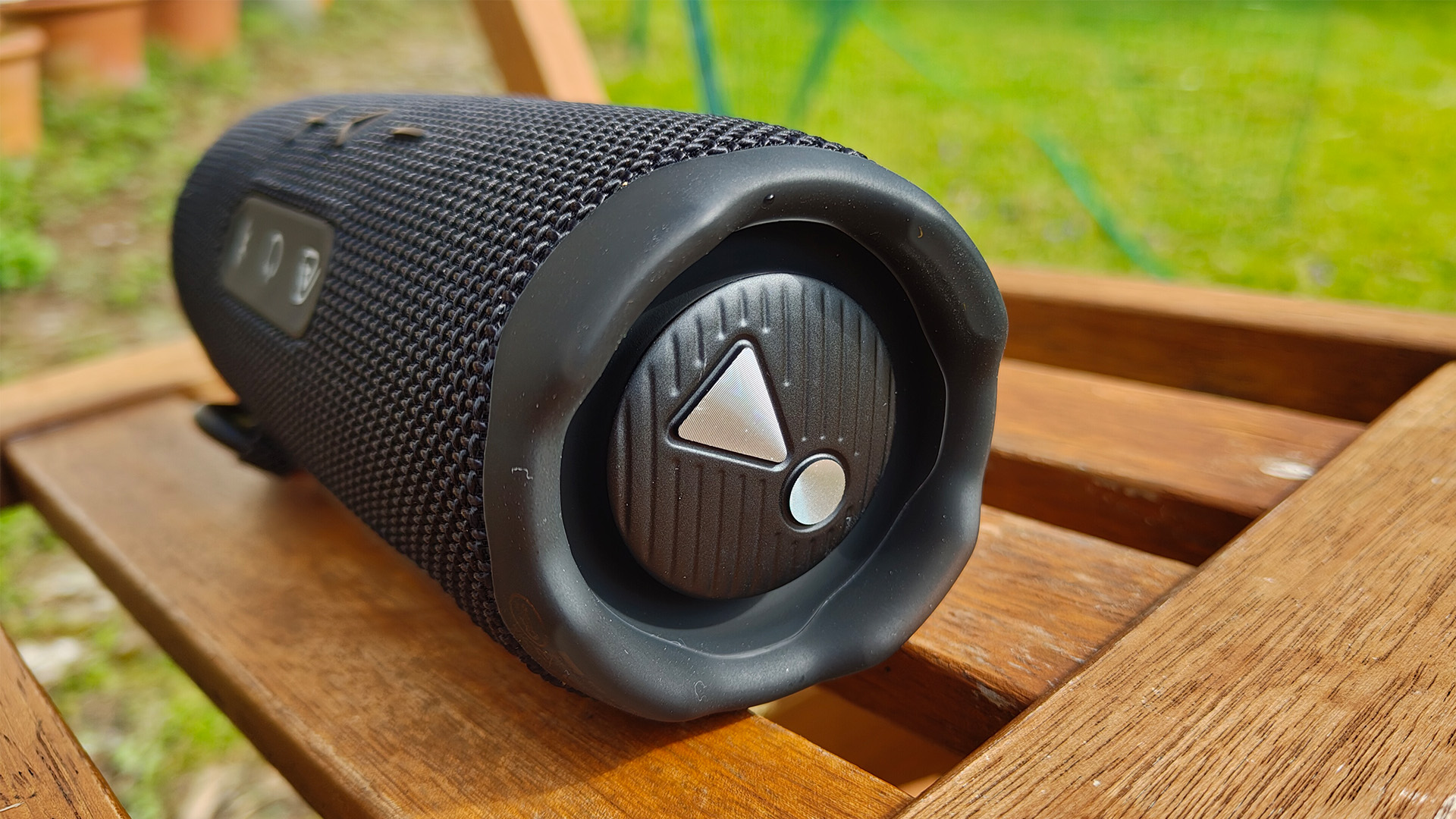
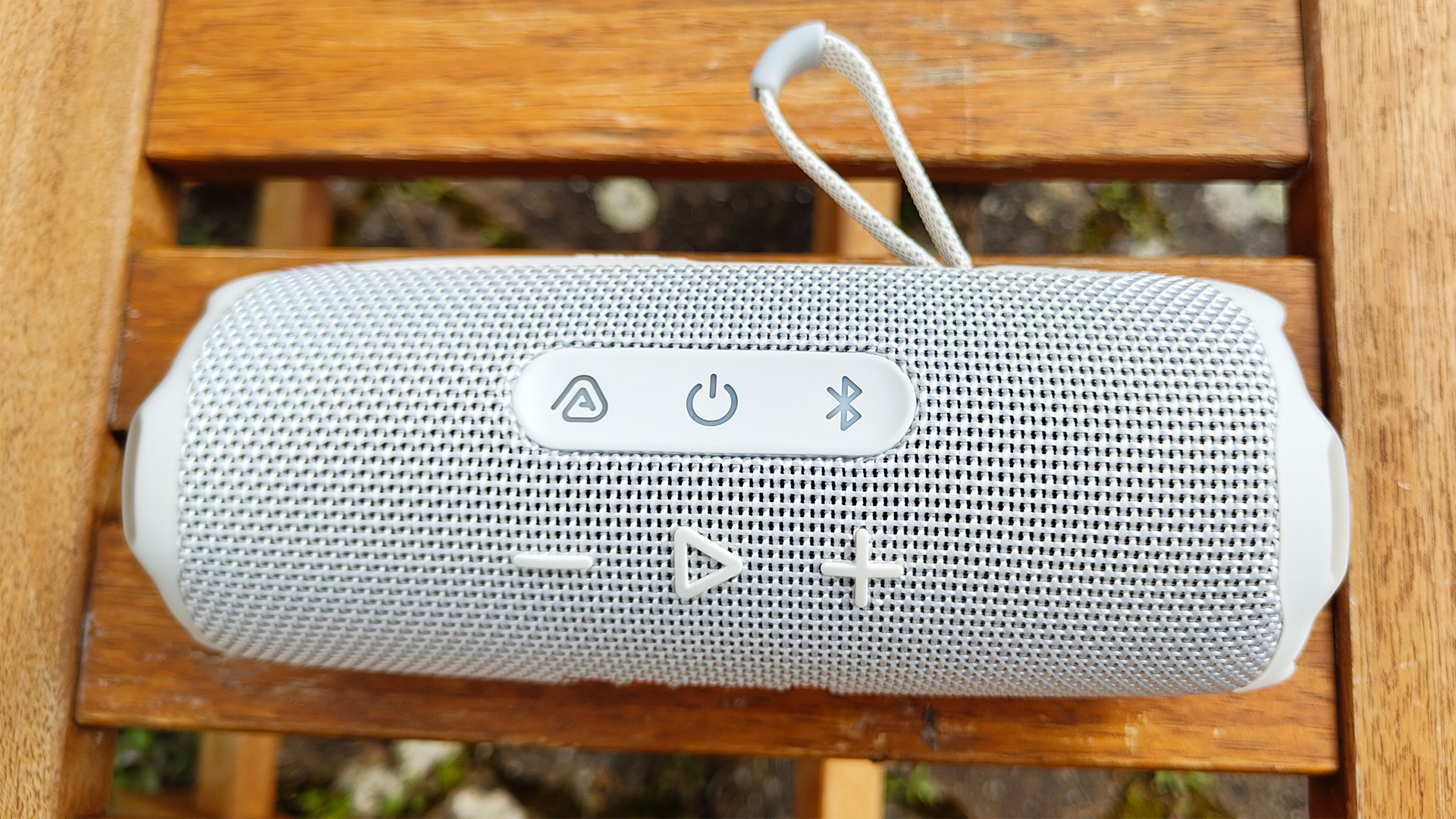
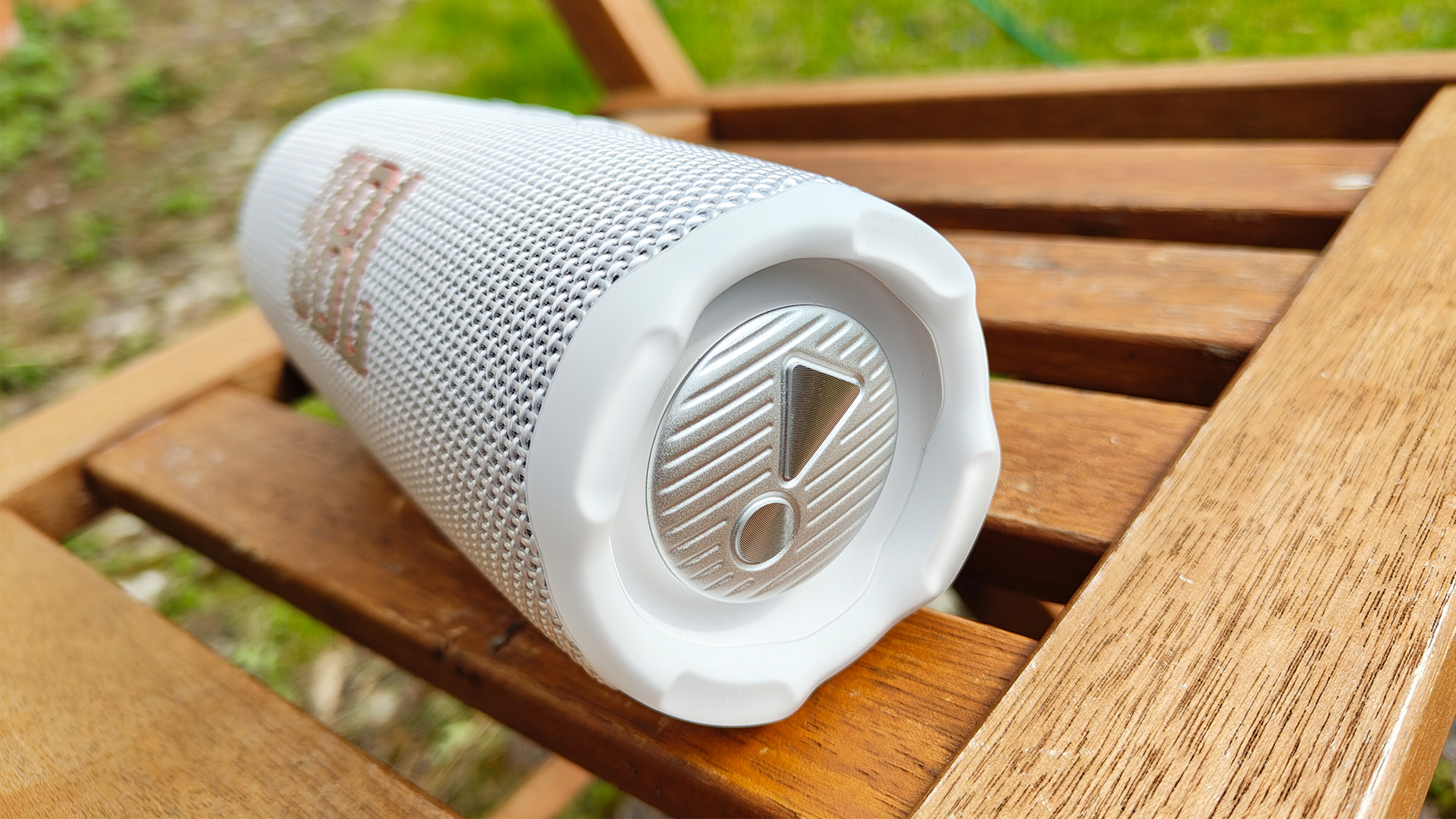
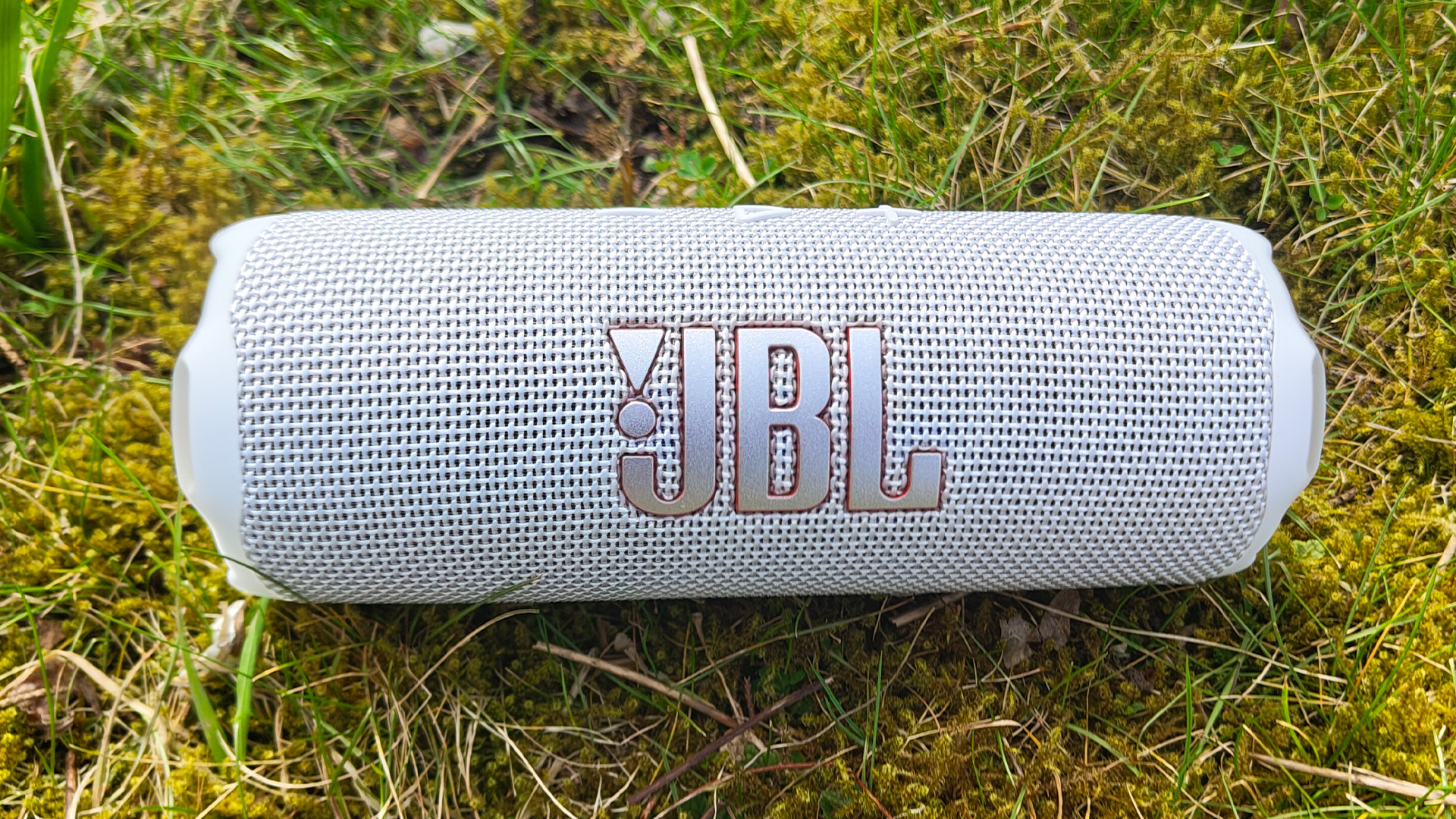
Specifications
Reasons to buy
Reasons to avoid
Anyone who finds the size or price of the Charge 6 above a little too much should consider the five-star JBL Flip 7. Smaller, slimmer and less expensive, the Flip 7 still offers a great deal of what you'd want in a portable Bluetooth companion.
The older generation model boasted a still-impressive IP67 water and dustproof rating, but JBL has decided to up the ante by bestowing a mighty IP68 certificate upon this newest iteration.
Ditching the built-in adjustable carry loop of its predecessor, the Flip 7 offers a choice of either a fabric finger loop or a carabiner hook for clipping the speakers onto the likes of bags or nearby branches.
Like the Charge 6 above, the Flip 7 goes big on features. The seventh-gen Flip offers Auracast functionality, the new sharing technology which lets you pair two Flip 7s together in stereo or hook up multiple units via the JBL Portable app.
The new Flip will grant you 14 hours on a single charge plus an extra two with Playtime Boost. The Flip 7 also features wired listening for the first time, supporting up to 24-bit/96kHz lossless audio playback via USB-C, meaning that it should sound its absolute best when using a physical tether.
Sonically, this is the best Flip we've heard. It's bassier than before, with a smoother, more refined profile than the more hard-edged Flip 6 can manage. Detail levels are improved, while the dynamic peaks and troughs of your music are revealed with greater scope and scale.
Across the board, this is a big step up for the Flip. The similarly shaped Sony ULT Field 3 is set to challenge the Flip 7 (and the Charge 6) for Bluetooth supremacy, but for now, JBL's mighty burrito remains top dog.
Read our full JBL Flip 7 review
Best budget Bluetooth speaker
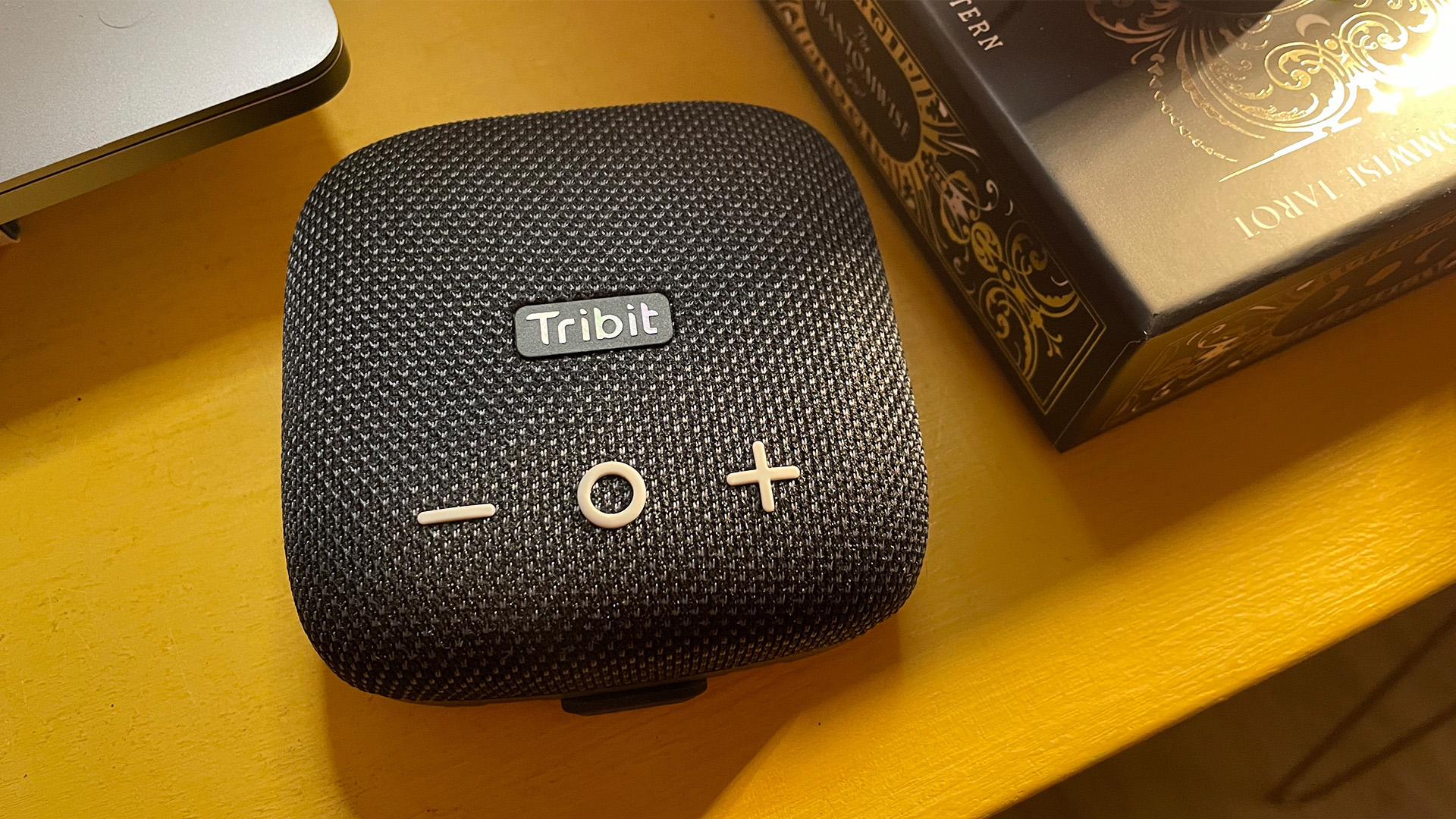
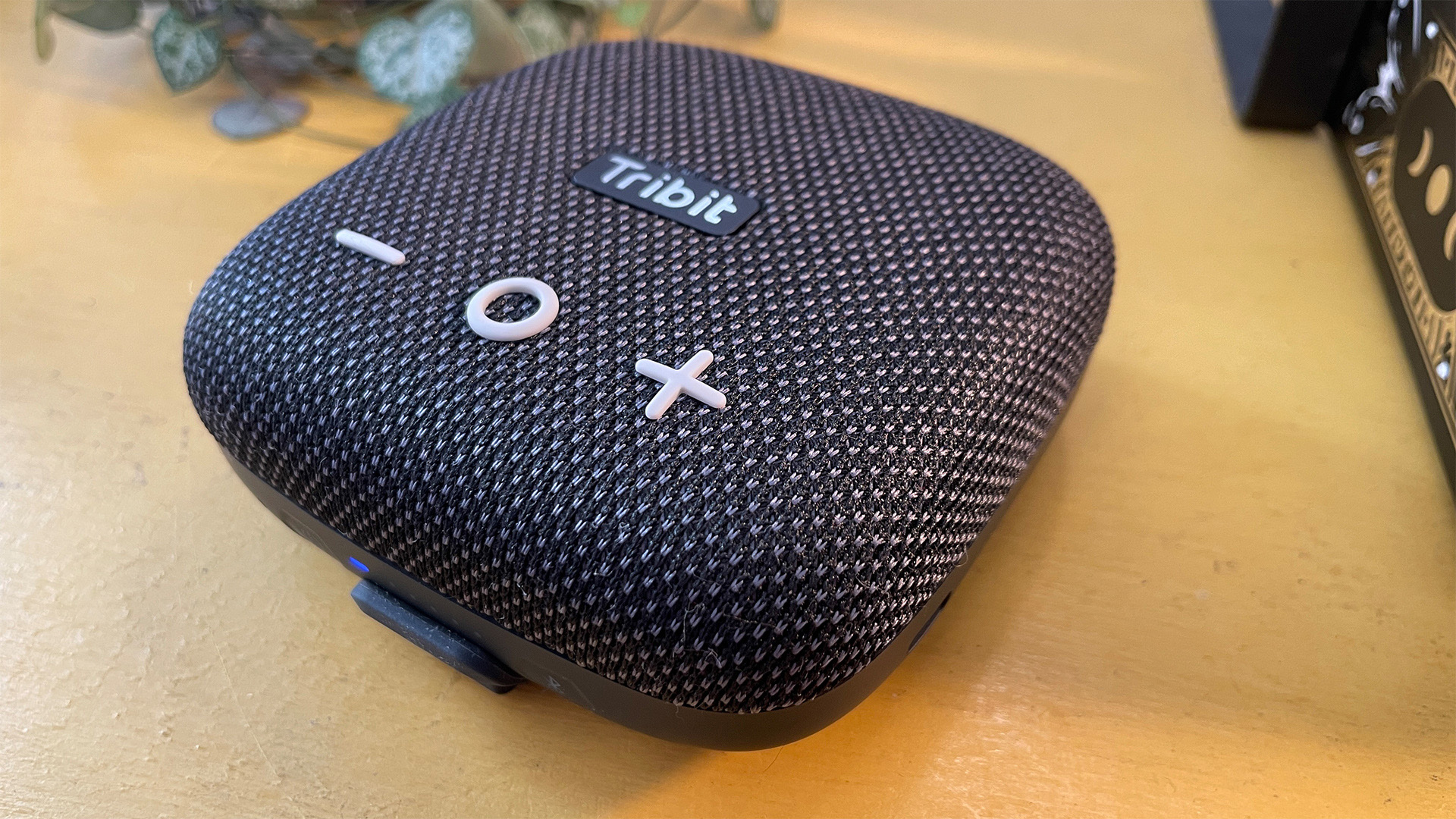
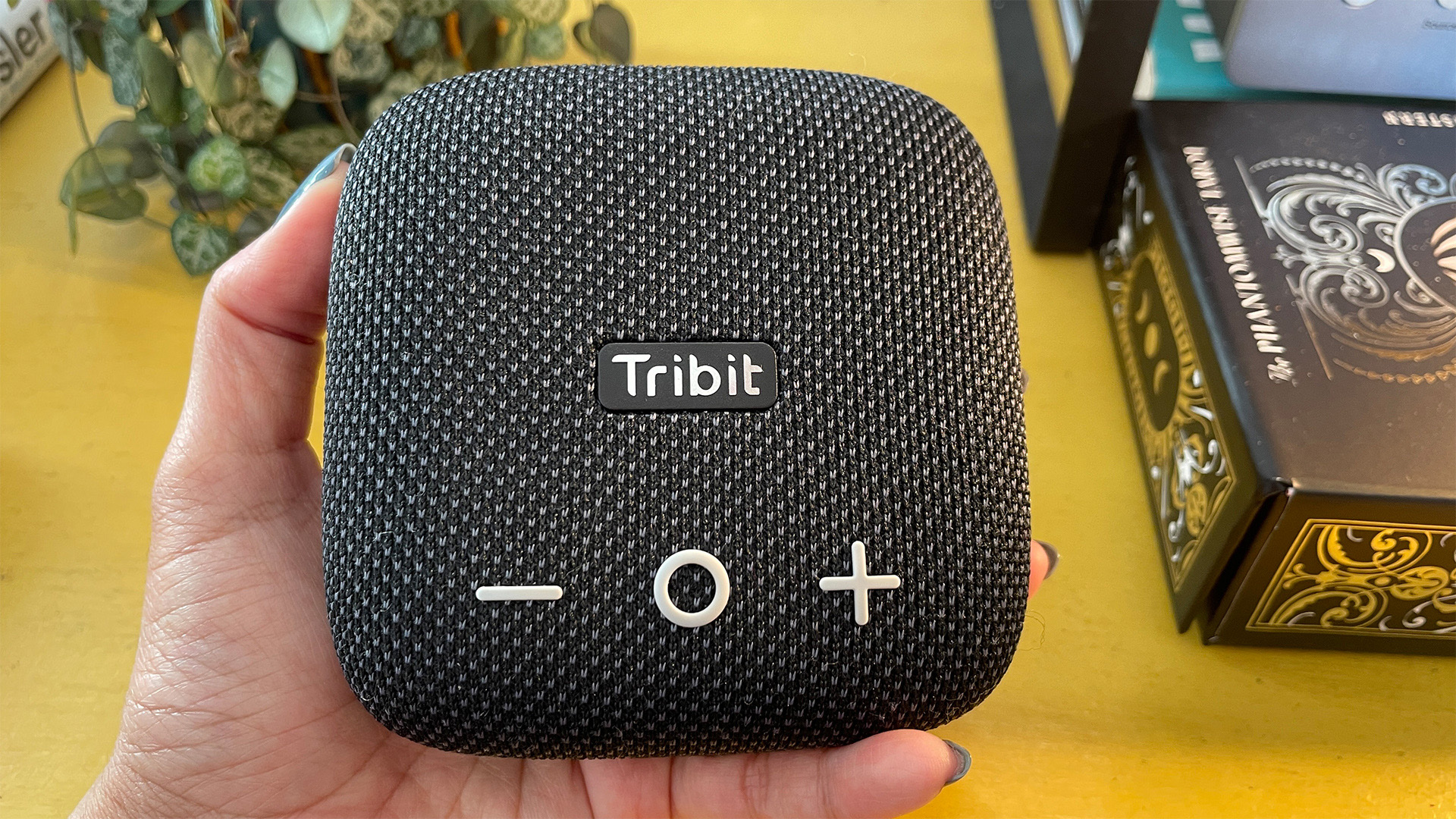
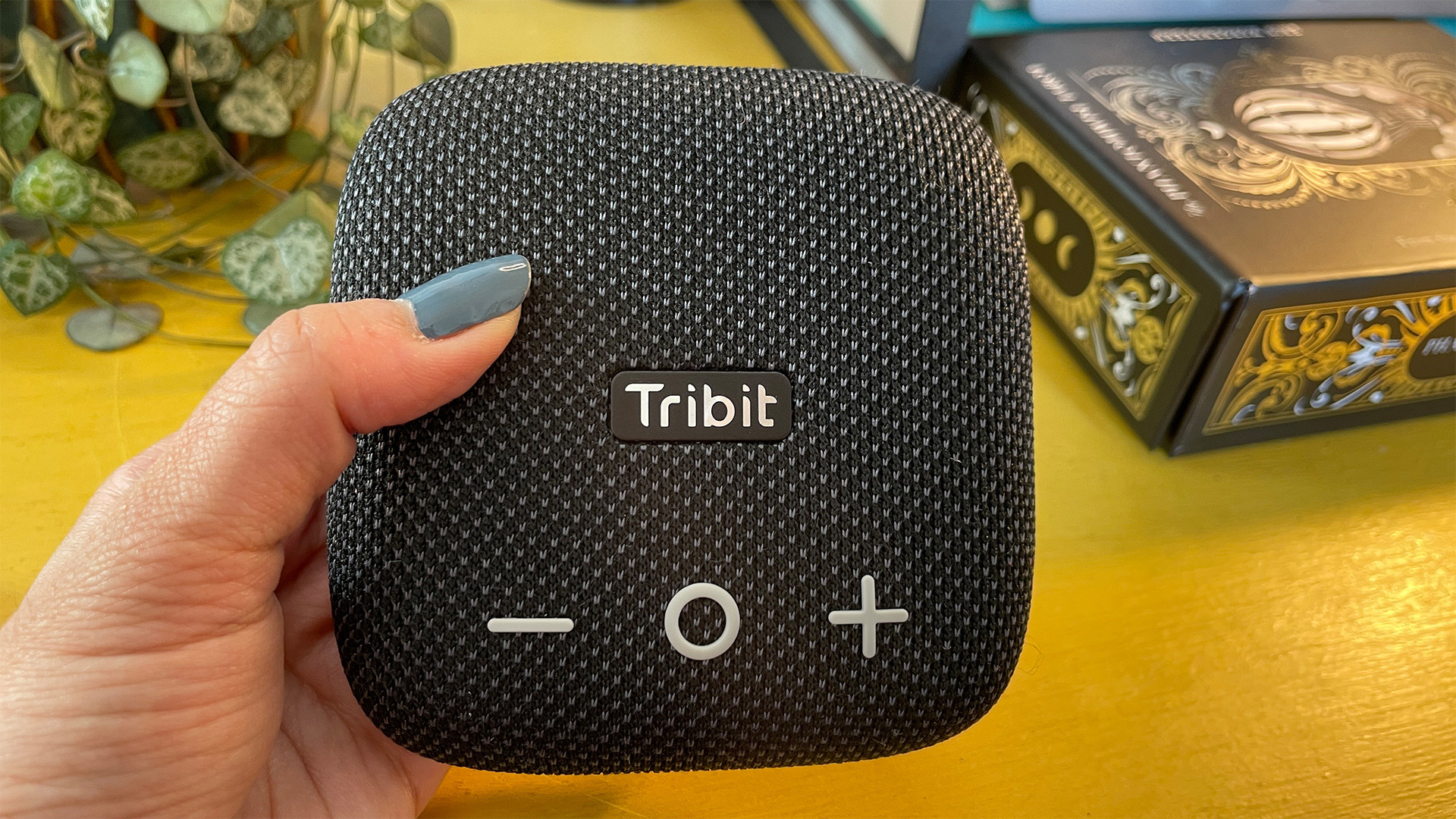
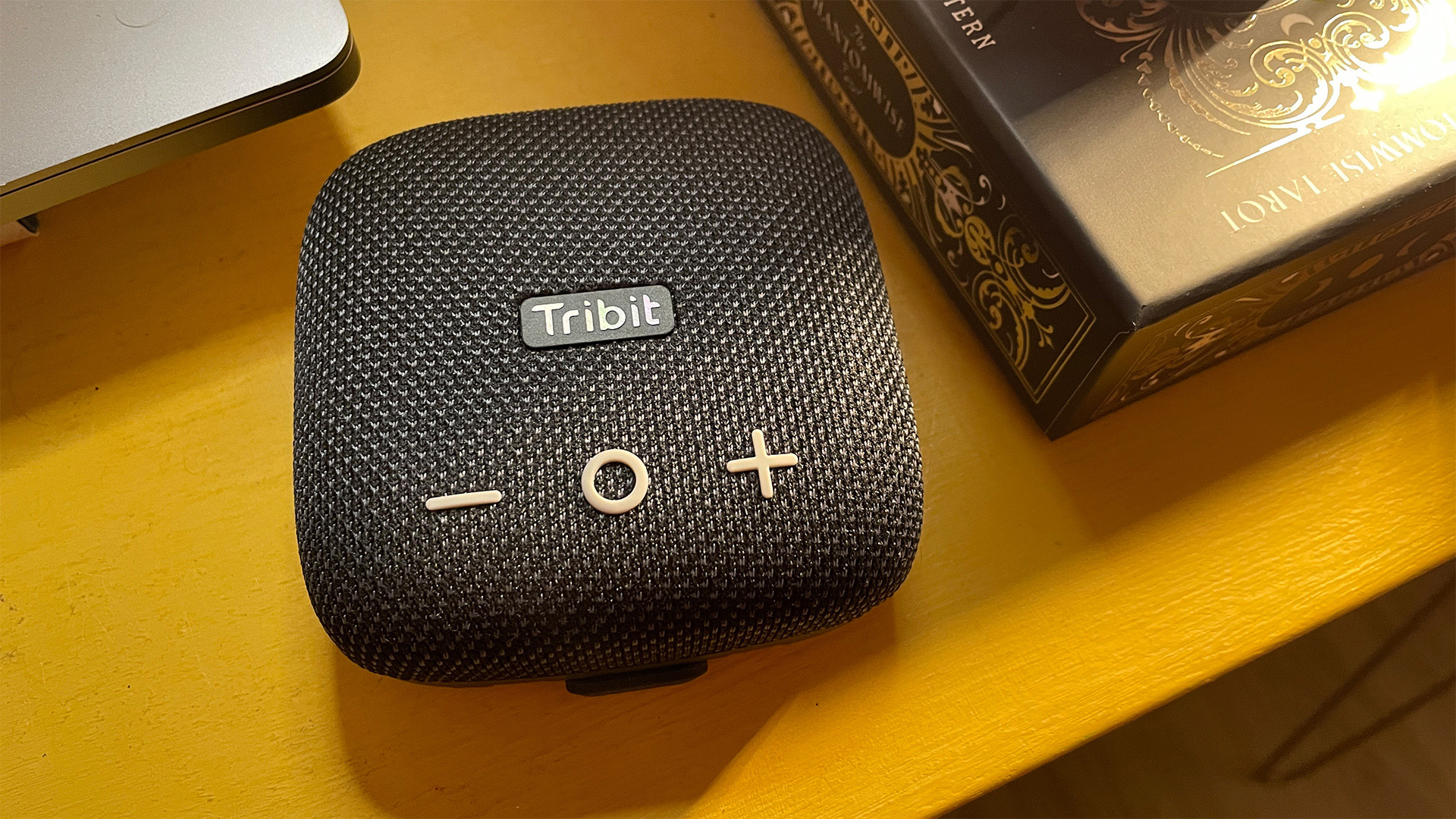
Specifications
Reasons to buy
Reasons to avoid
If all you need from your ideal Bluetooth speaker is portability alongside affordability, you'd struggle to improve on the small, satchel-friendly Tribit Stormbox Micro 2. A great and inexpensive alternative to the Flip 6 above, the Micro 2 fits flat in your hand in contrast to the cylindrical form of the Flip.
Sporting a utilitarian but not unattractive woven finish design, the Micro 2 pumps out genuinely enjoyable audio and a rather impressive battery life of around 12 hours during testing.
Better yet, its IP67 rating allowed one of our team to test it in the shower without causing any lasting damage. Again, the Stormbox Micro 2's compact size and robust construction make it well-suited for venturing far beyond the confines of a bathroom or kitchen.
The audio is certainly a big plus point, too, going bigger, punchier and louder than you’d expect from such a diminutive unit, doing justice to most tracks in terms of tempo, rhythm and dynamics. The Stormbox's midrange is particularly pleasing, and we'd even go so far as to say that it's as good as anything else we’ve seen at this price.
Fine, the Stormbox Micro 2 can suffer from distortion at louder volumes, but it's still one of your best-value options if you’re really on a tight budget. Note that we're currently testing the JBL Go 4 as a potential rival for the Micro 2, meaning that our favourite budget model could have some serious competition at this level.
If you want to go smaller and cheaper, we'd recommend the five-star JBL Go 4 as a soap-sized alternative. It doesn't quite have the mid-range vocal clarity or the breadth of sound of the Tribit, but the Go 4 is exceptional value considering how much sonic life and dynamism it keenly demonstrates.
Read our full Tribit Stormbox Micro 2 review
Best mid-price Bluetooth speaker
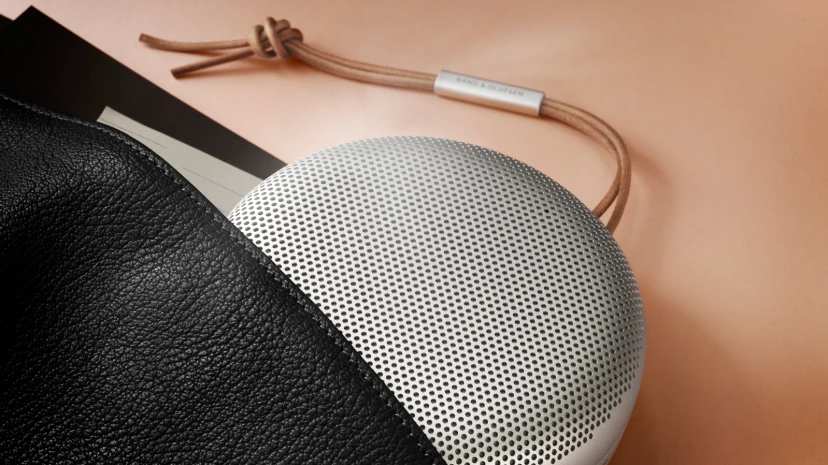
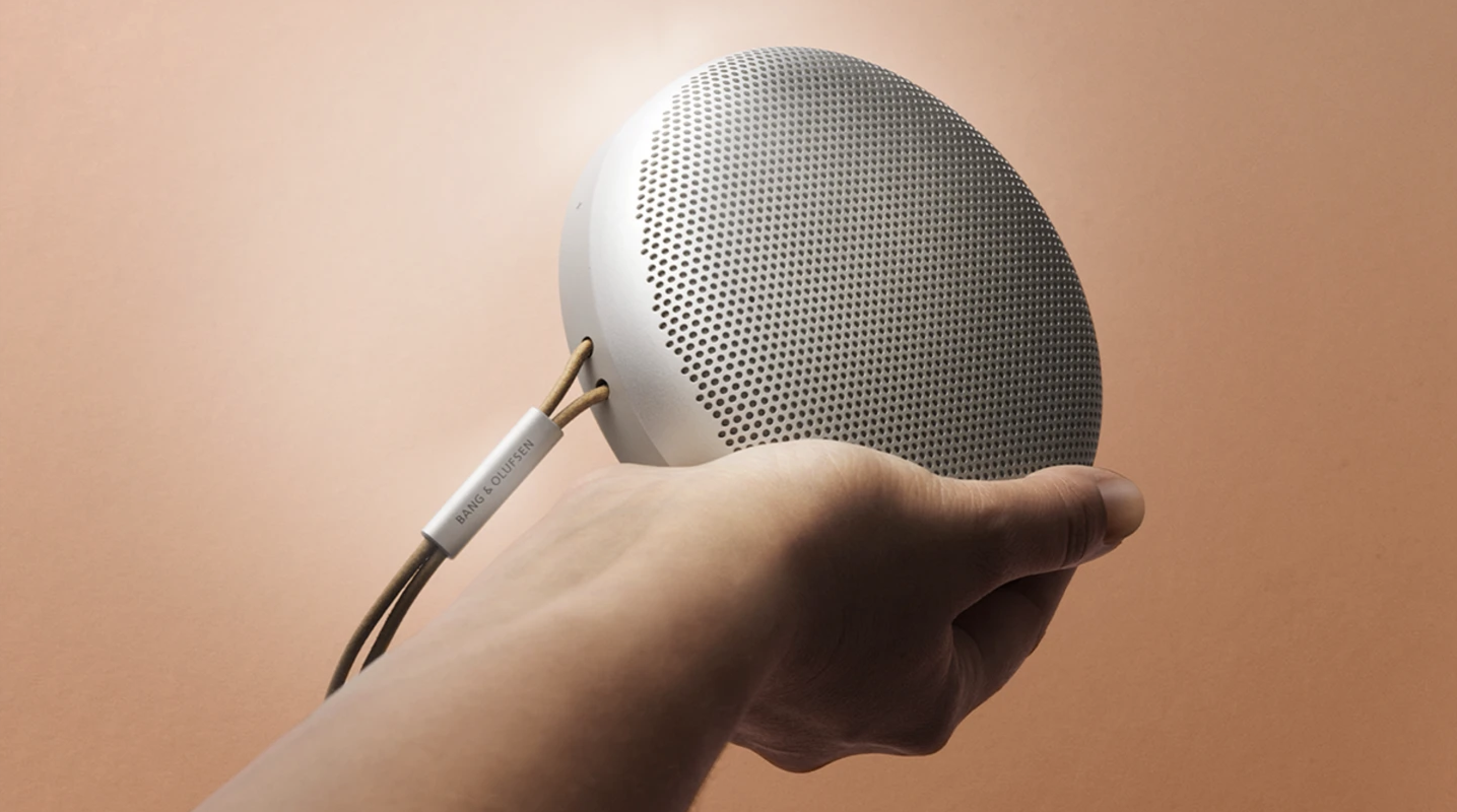
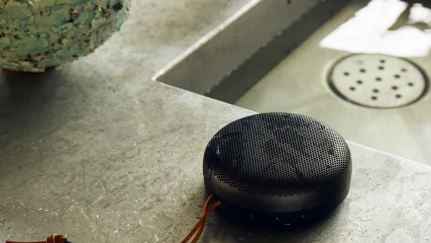
Specifications
Reasons to buy
Reasons to avoid
Before we get started with the Beosound A1 (2nd Gen), we'd like to inform you that there is now a newer, third-generation Beosound available now. The Beosound A1 (3rd Gen builds on the same design blueprint, delivers a natural and detailed midrange, ditches Alexa, but adds wired USB-C listening.
It's easy to covet and has earned a spot in our also consider section, but if you want Alexa integration and a much lower price, the second-generation five-star model is a savvy buy with serious sonic talent.
The Beosound A1 (2nd Gen) definitely the Bluetooth speaker for those among us who don't like to follow the herd. You can have your JBLs and your Tribits, as the Bang & Olufsen Beosound A1 (2nd Gen) is for anyone who prioritises luxury, style and a bit of personality from their electronics.
This is the speaker for those people who could choose an Audi, VW or BMW, but go for an Alfa Romeo instead.
Admittedly, saying that the A1 sports similar dimensions to a medium-sized hamburger doesn't sound that luxurious, but rest assured: it's a beautiful, very well-made speaker only bested in the looks department by the rather stunning Dali Katch G2 in our also consider section.
The Beosound A1 (2nd Gen) supports Qualcomm’s latest aptX Adaptive Bluetooth 5.1 codec and features Alexa built-in, as long as you're connected to the wi-fi when you want to speak to her. That's a smart feature that most of the rivals on this list don't have, by the way.
Sonically, we consider this to be one of Bang & Olufsen's best models, presenting a pleasingly comfortable yet authoritative performance that you could easily listen to all day.
Throw in its classy, well-made design, easy-to-use operation and the bonus of Alexa, and suddenly things start to make a whole lot of sense.
Read our full Bang & Olufsen Beosound A1 (2nd Gen) review
Best premium Bluetooth speaker
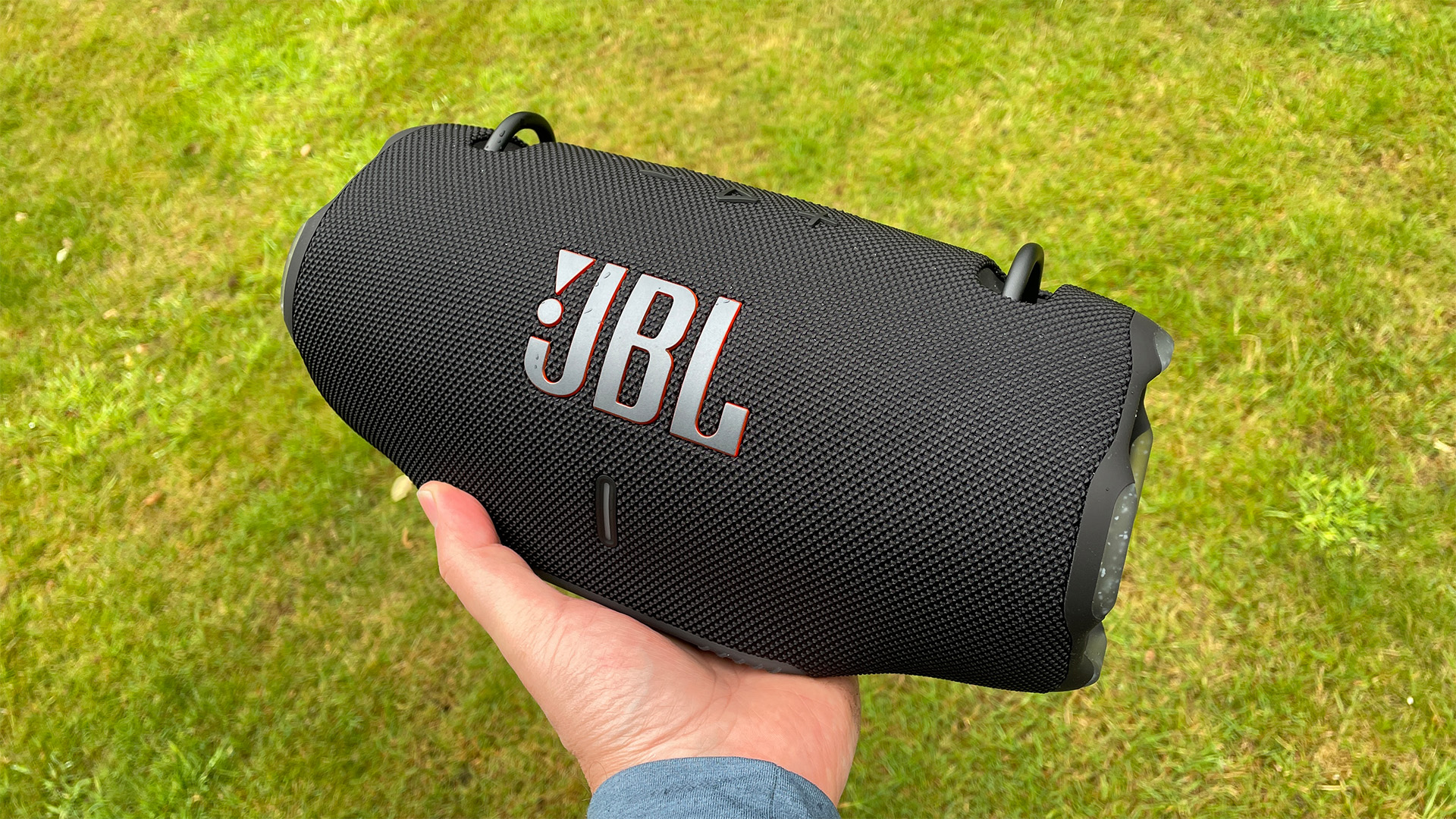
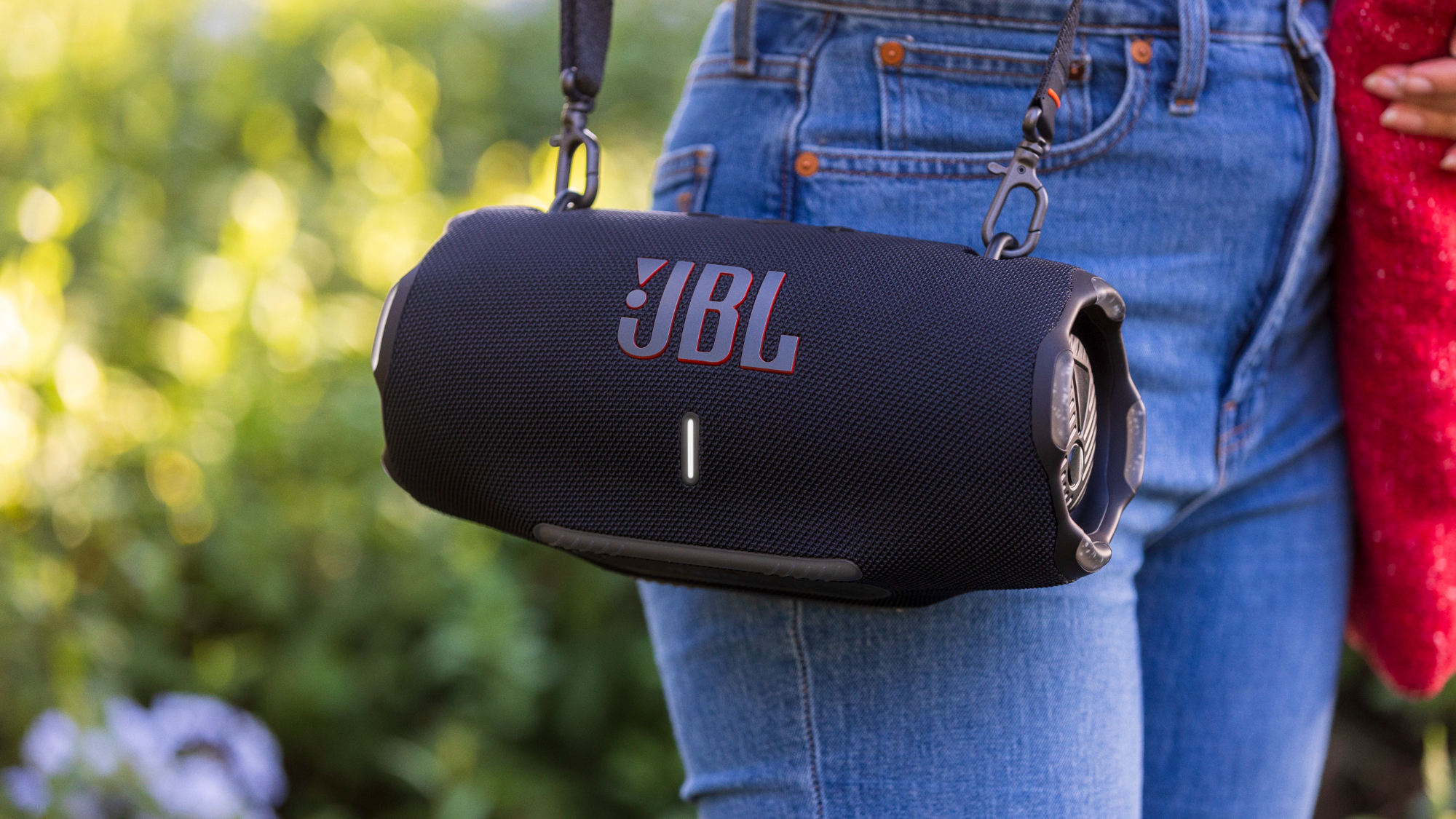
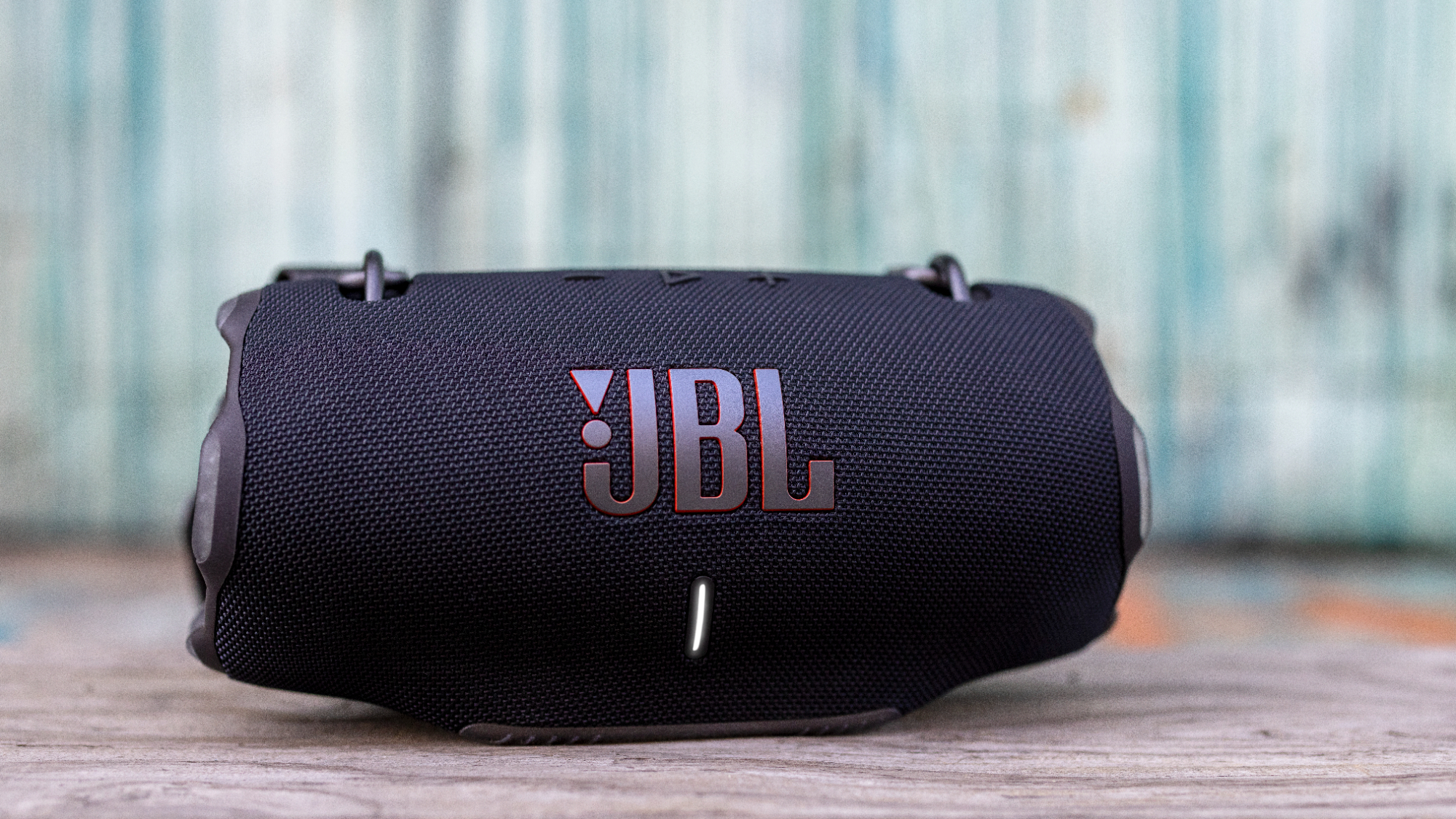
Specifications
Reasons to buy
Reasons to avoid
For JBL, the Xtreme 4 simply confirms once again that this is a company working at the top of its game. The Xtreme 3 was a five-star portable powerhouse which provided a rock-solid foundation from which to grow, with the fourth-gen sequel building on that base and taking the levels to stunning heights and banking a What Hi-Fi? Award in the process.
The Xtreme 4 is, in simple terms, the Xtreme 3 but better. The design is roughly the same as the outgoing model, albeit with some minor distinguishing tweaks.
The button layout is now a block of six rather than a strip, while a new base with two strips of silicon feet gives the speaker more stability and grip. Apart from that, it's the same rugged, robust, IP67-rated build as the Xtreme 3, and that's no bad thing; it's a design that has served JBL extremely well in the past.
The driver configuration for the Xtreme 4 is the same as the previous model, with two 70mm woofers and two 20mm tweeters behind the grille and then those pulsating radiators at either end.
Sonically, though, things have been taken to the next level, offering up the best audio performance we've heard at this level for one of the best-sounding Bluetooth speakers of the past few years.
As our review made clear: "For such a chunky speaker it produces a fantastically refined sound. It produces a wonderfully clear and consistent sound across tracks: low frequencies are poised and punchy but don’t lack weight, (whereas) highs are crisp enough so they don’t feel rolled off".
New features only enhance the Xtreme 4's credentials. Auracast is the big one, letting you pair two Xtreme 4 speakers together in stereo or connect multiple compatible JBLs in a chain while giving the new model some element of future-proofing should upcoming features that require the tech emerge in the coming months.
The JBL app is as user-friendly and comprehensive as ever, while 24 hours is a big improvement on the 15 hours of the previous model. Like the Charge 5, the Xtreme 4 will charge up connected devices via USB-C, and there's even a replaceable battery if the built-in unit packs up.
All in all, yet another belting speaker from JBL. If you've got the cash to stretch a bit further up the price ladder, the Xtreme 4 is our nailed-on pick, with discounts already coming in to make its price even more attractive.
Read our full JBL Xtreme 4 review
Best multi-room Bluetooth speaker
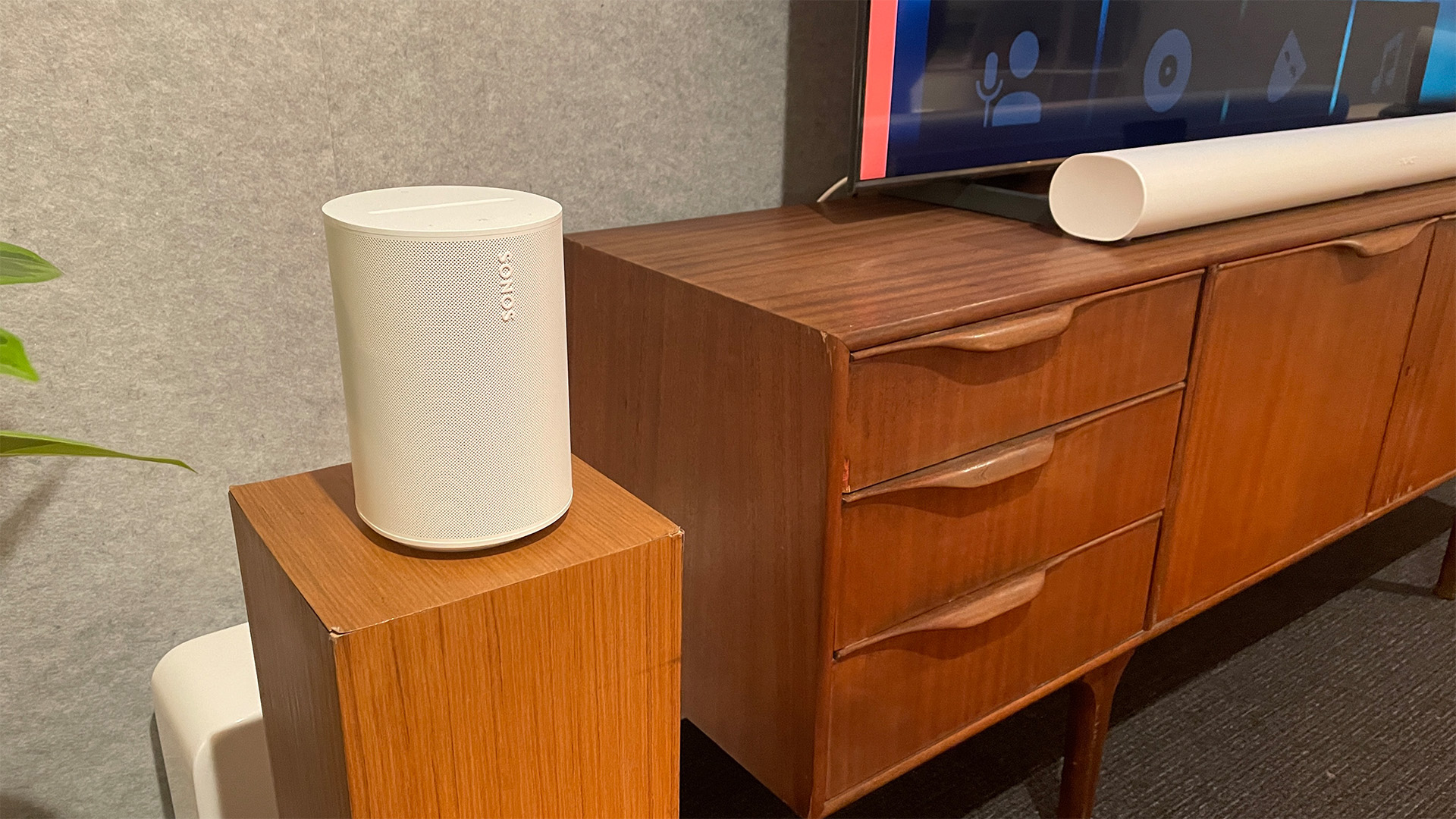
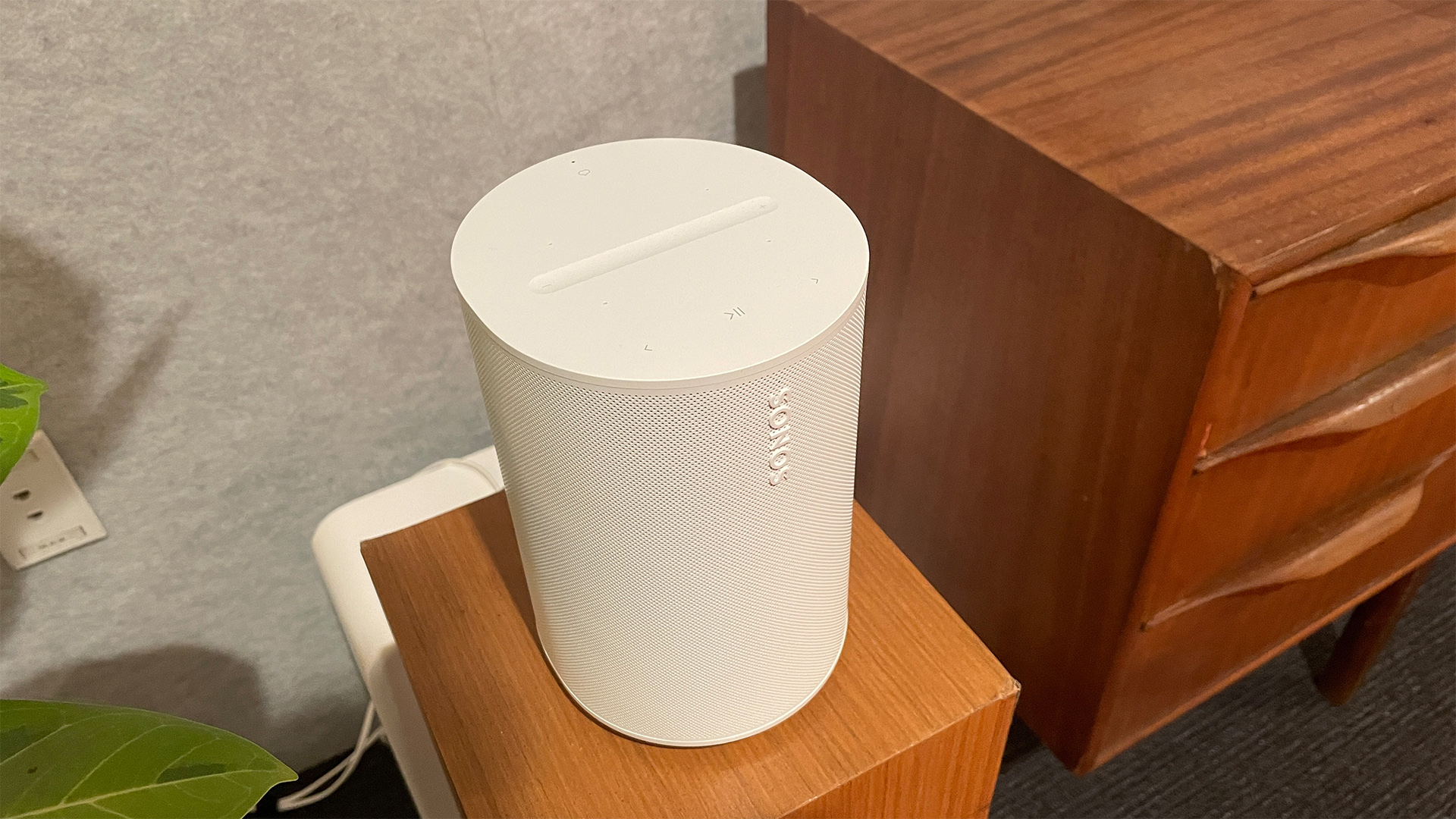
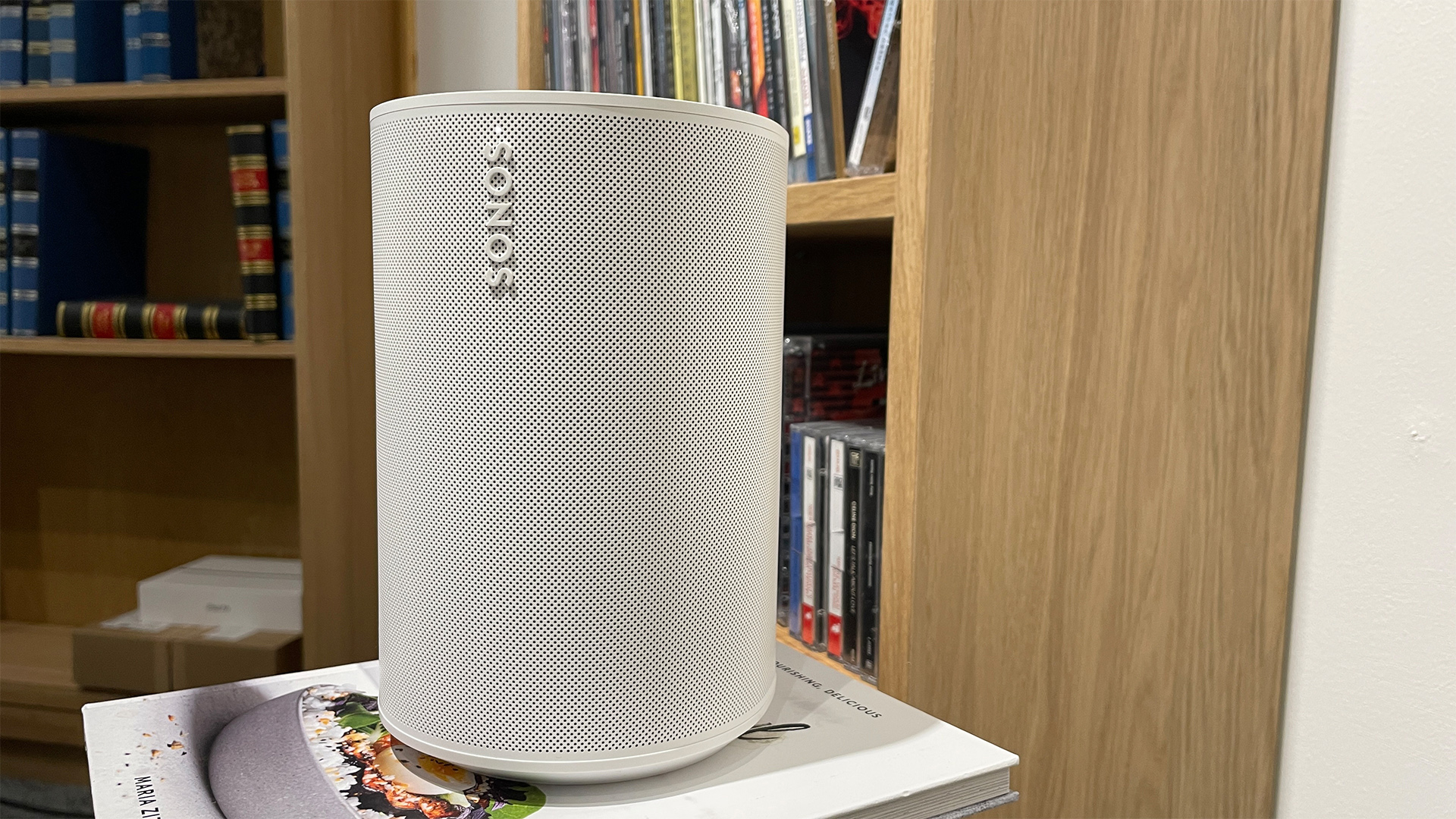
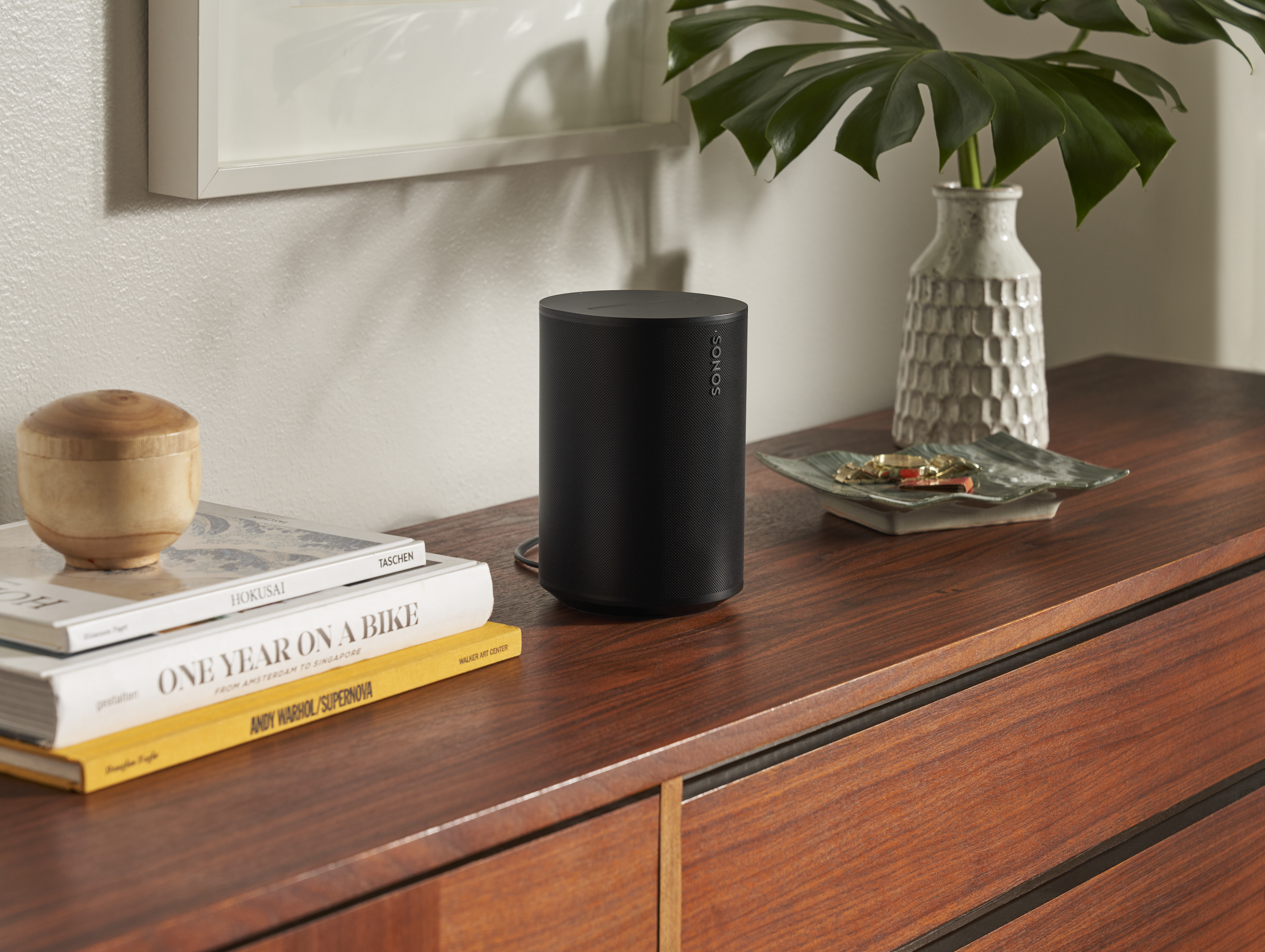
Specifications
Reasons to buy
Reasons to avoid
It isn't just traditional, portable Bluetooth speakers on this list. The Era 100 is, alongside the Award-winning Era 300, one of the best speakers that Sonos has made in quite some time, and thanks to its Bluetooth capabilities, it's eligible for a spot on this rundown
The Era 100 is a certified five-star performer, combining updated specs and features with an overhauled design to deliver one of the most sonically satisfying speakers Sonos has ever made at this level.
Reconceived from the ground up, the Era 100 sports brand-new drivers in the shape of two angled tweeters with customer waveguides alongside a woofer that's 25 per cent larger than the Sonos One, with each unit powered by its own Class D amplifier.
This, alongside a faster processor, translates into a much better sound than Sonos managed with the Sonos One, and while the One was mono only, the Era 100 can pump out a satisfying stereo experience.
The bass profile feels deep, full and substantial, while the clarity and detail across the spectrum make for a cohesive, balanced listen. Even the timing is excellent!
The Era 100 is more of a stationary, use-at-home unit, but that Bluetooth connectivity does afford you more flexibility in terms of how you use it. With such ambitious levels of performance, we think it's one of the finest wireless Bluetooth speakers you'll find at this price.
The Era 100 has been around for more than two years now, so we've hoping that, alongside its bigger brother, a new edition could be coming in 2026.
Read our full Sonos Era 100 review
Best smart Bluetooth speaker
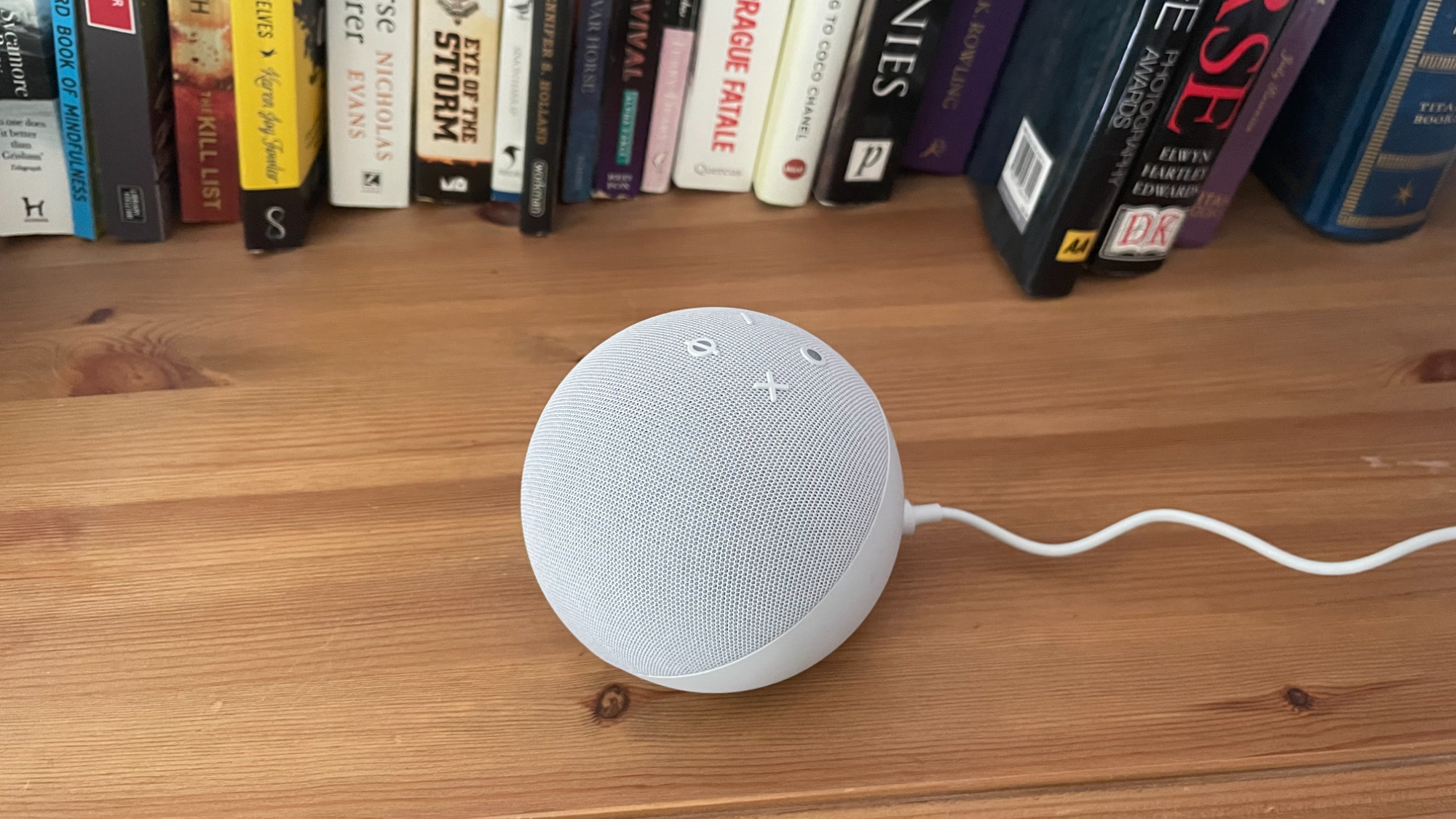
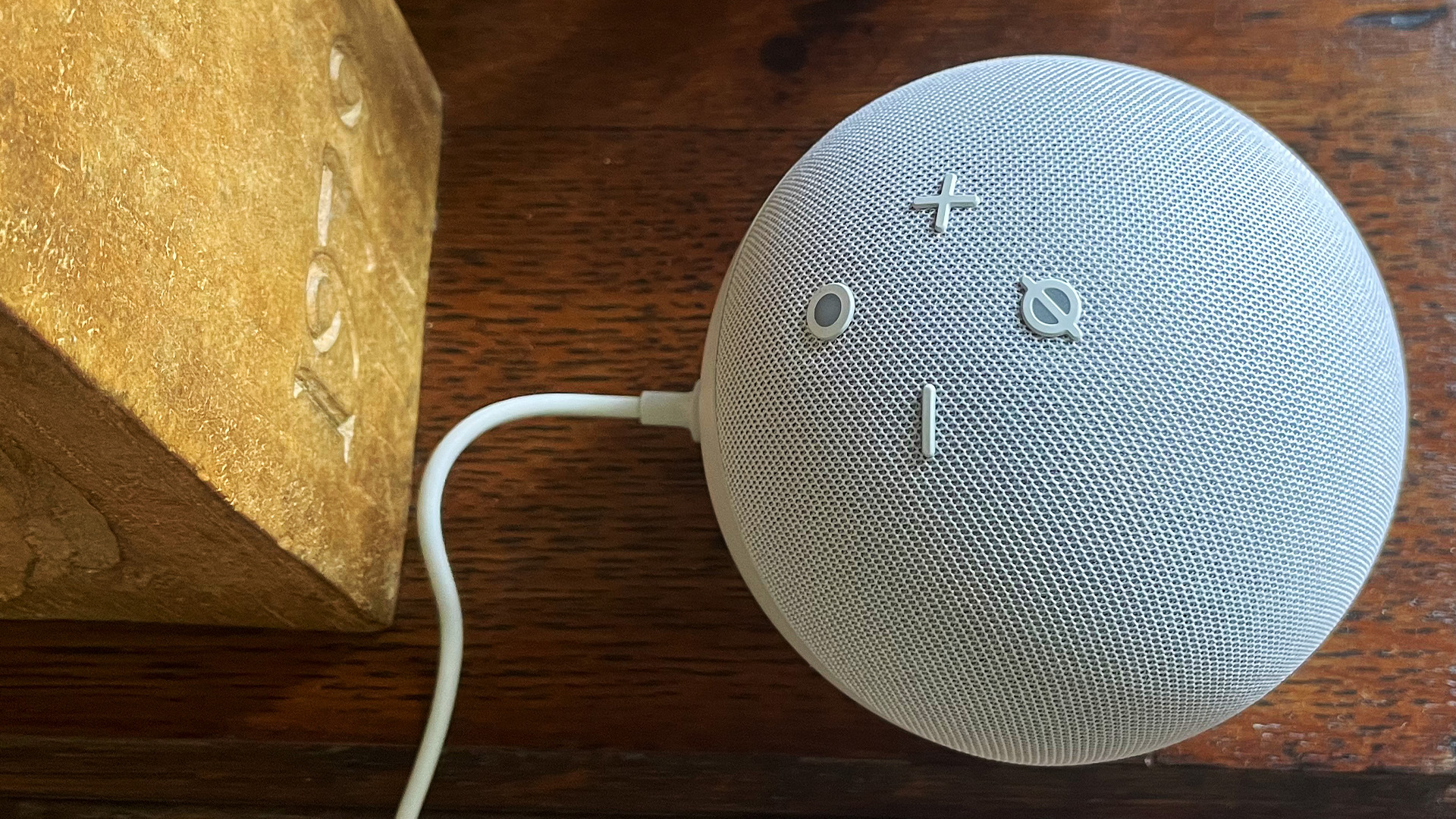
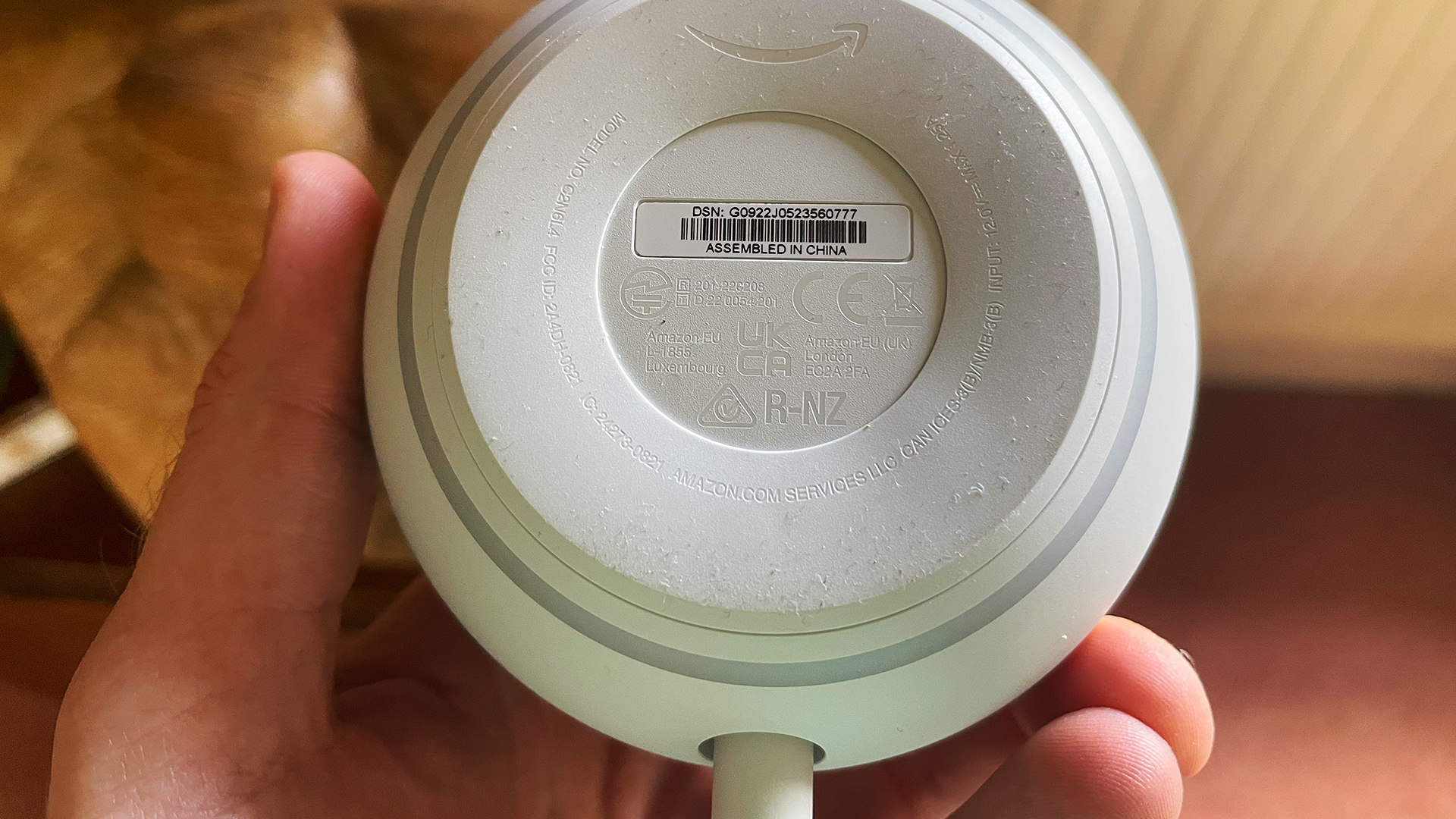
Specifications
Reasons to buy
Reasons to avoid
The Echo Dot (5th Gen) is still the best smart speaker Amazon makes. The newer Echo Dot Max debuted earlier in 2025, but its middling sound and inflated price mean we're still recommending the smaller, cheaper edition.
No, the Echo Dot isn't a traditional Bluetooth speaker according to our usual criteria. It's not portable as it requires a plugged-in connection to the wall, plus it relies on wi-fi for Alexa to work at all.
You can (and will), however, utilise Bluetooth to connect your iPhone to the Echo Dot, especially if you want to play music stored locally, qualifying it as a Bluetooth speaker on more than a mere technicality.
Either way, the Echo Dot (5th Generation) truly earns its place on this list thanks to its all-around excellence and hugely attractive price tag.
It may be cheap, but nothing about the Dot feels tacky or cut-price, and whereas once Alexa was a one-note performer capable of answering basic questions about the weather and knowing the capital of France, now she's as bursting with skills and knowledge as Keanu Reeves after he's been uploaded with various handy computer programs.
The Dot's AI assistant is more helpful than ever, stuffed with so many tricks that you'll often find yourself falling into the trap of speaking to Alexa as though "she" were a real person.
Audio has come a long way, too. Amazon's so-called “best-sounding Echo Dot yet” lives up to its billing thanks to a single 44mm front-firing speaker (4mm larger than the previous gen’s 40mm), offering audio that feels, for the size, weighty, listenable and surprisingly versatile.
For non-Apple devotees seeking a smart companion on a budget, the Echo Dot is a fine alternative to the HomePod Mini, the latter of which doesn't offer Bluetooth support. We've got the Echo Dot Max in for testing at the moment (around £100 / $100), so we'll let you know if it ousts the current Dot as our go-to Amazon smart speaker.
Read our full Amazon Echo Dot (5th Generation) review
Best premium Bluetooth speaker
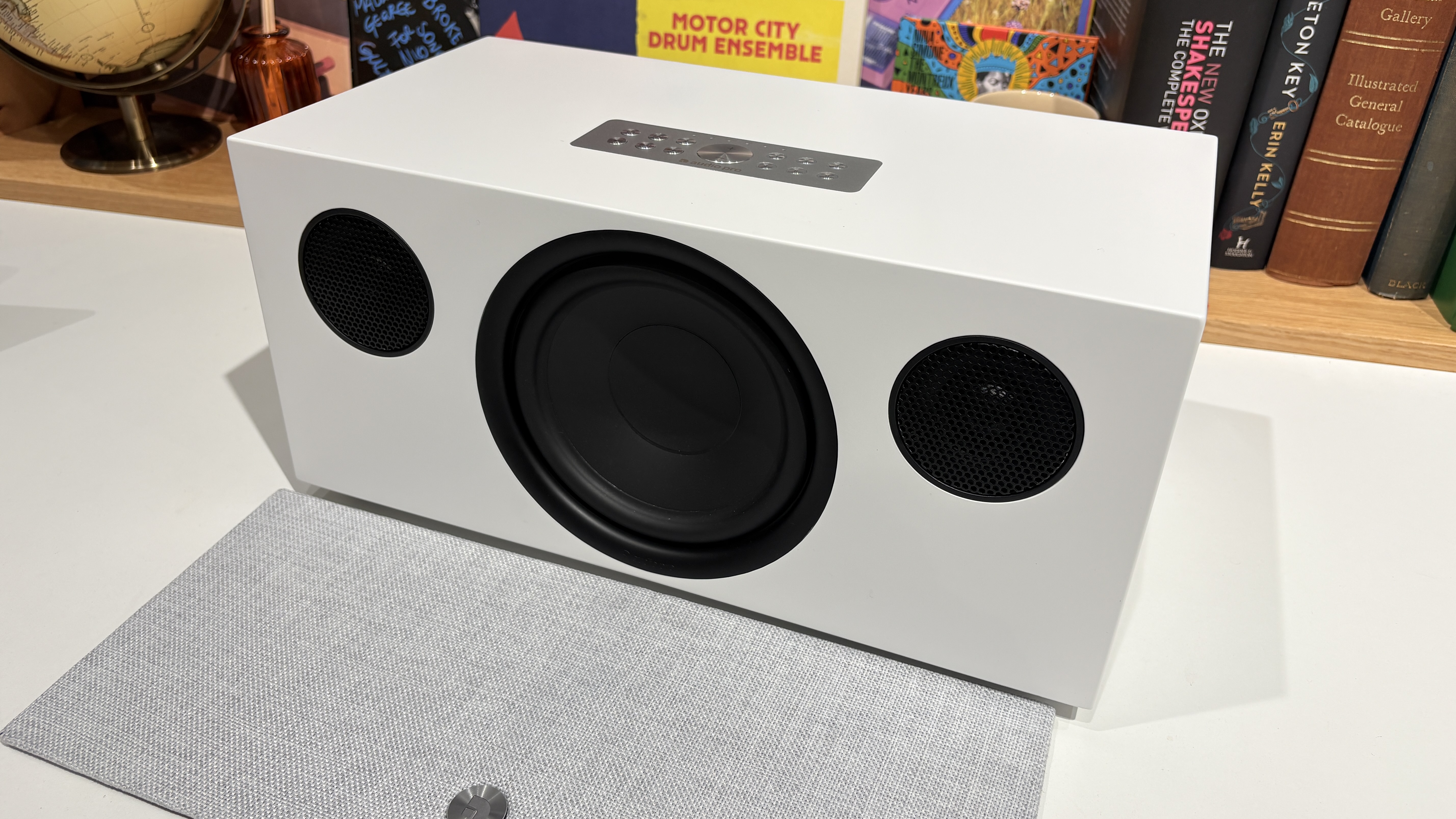
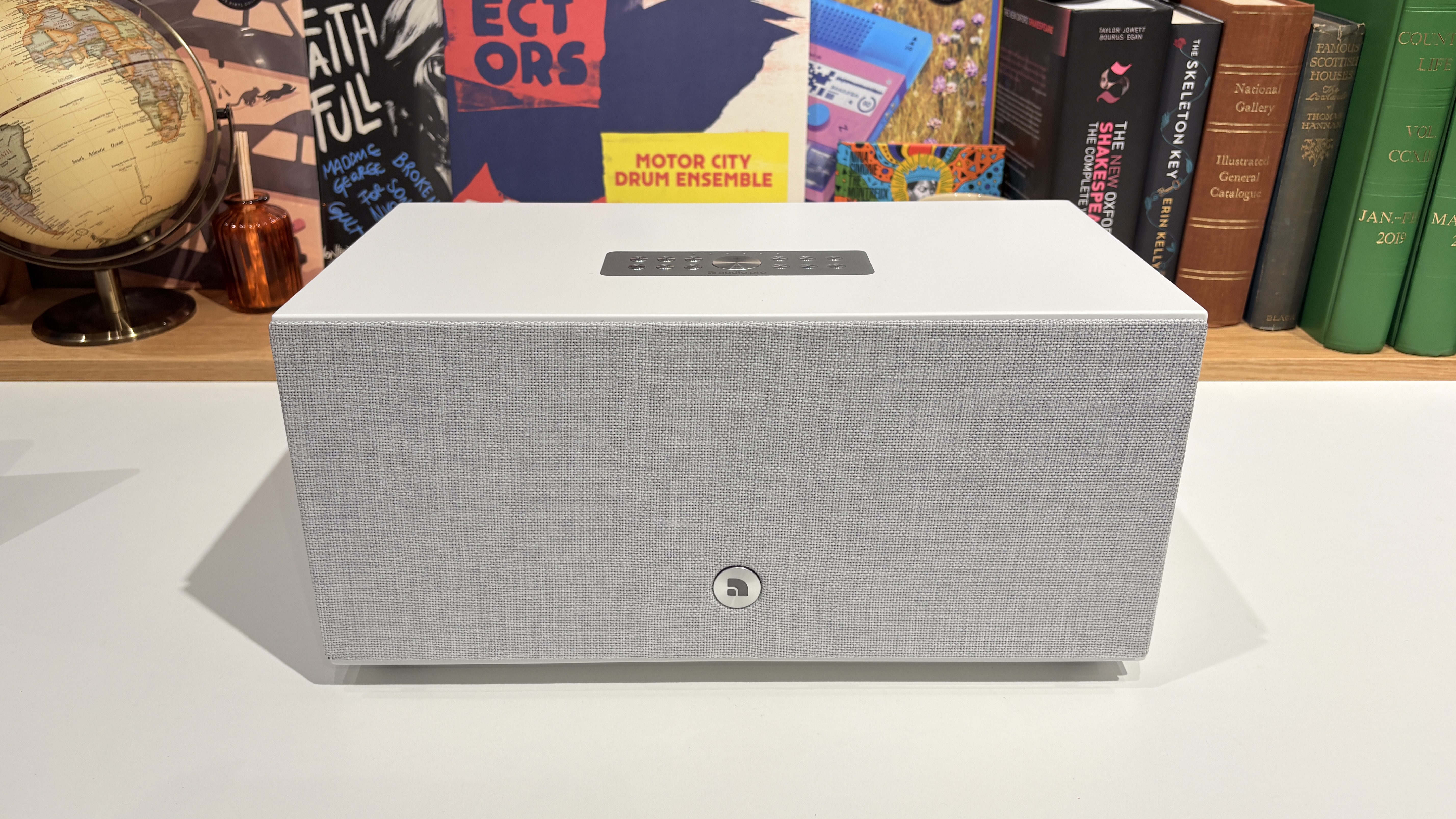
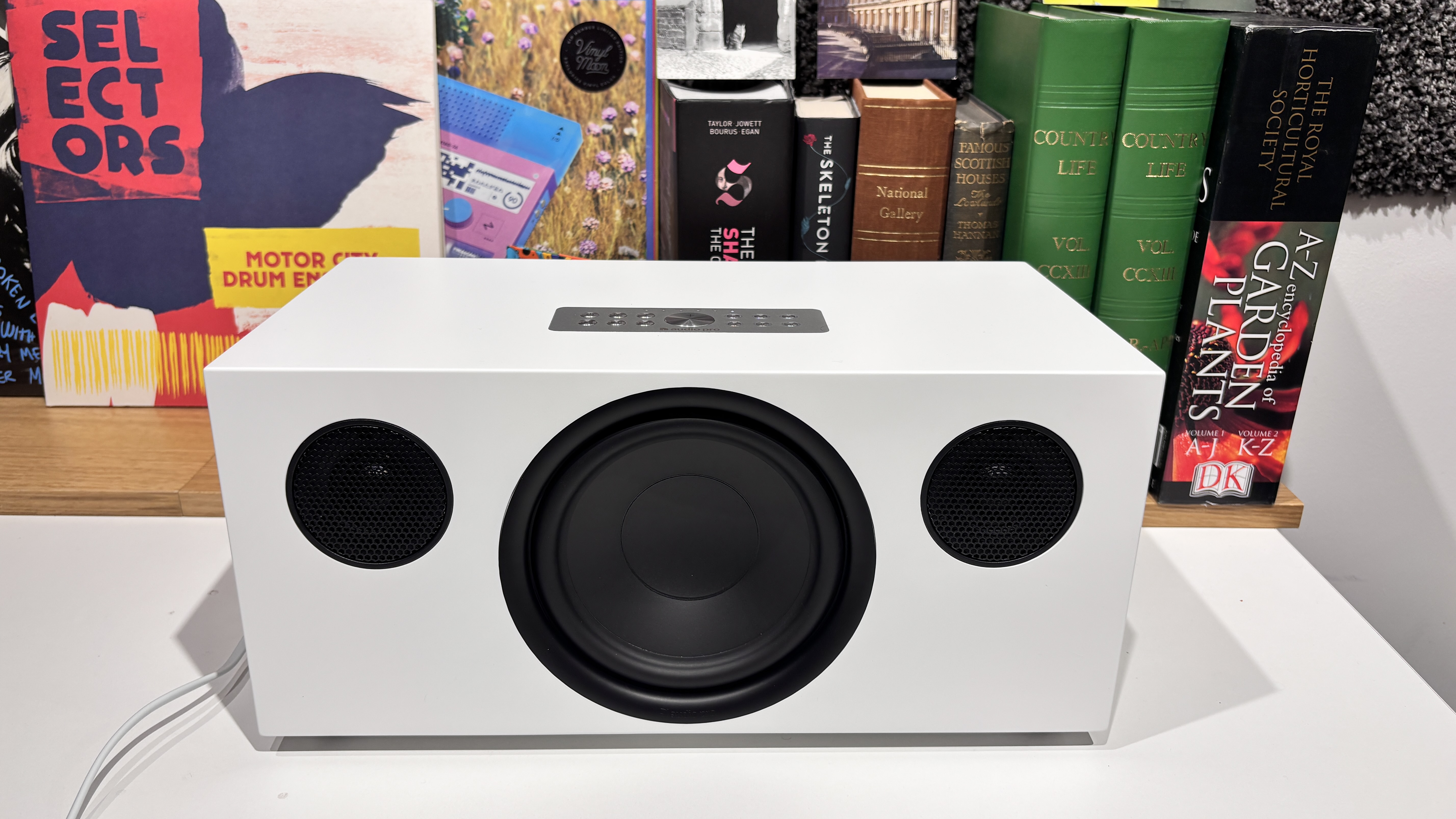
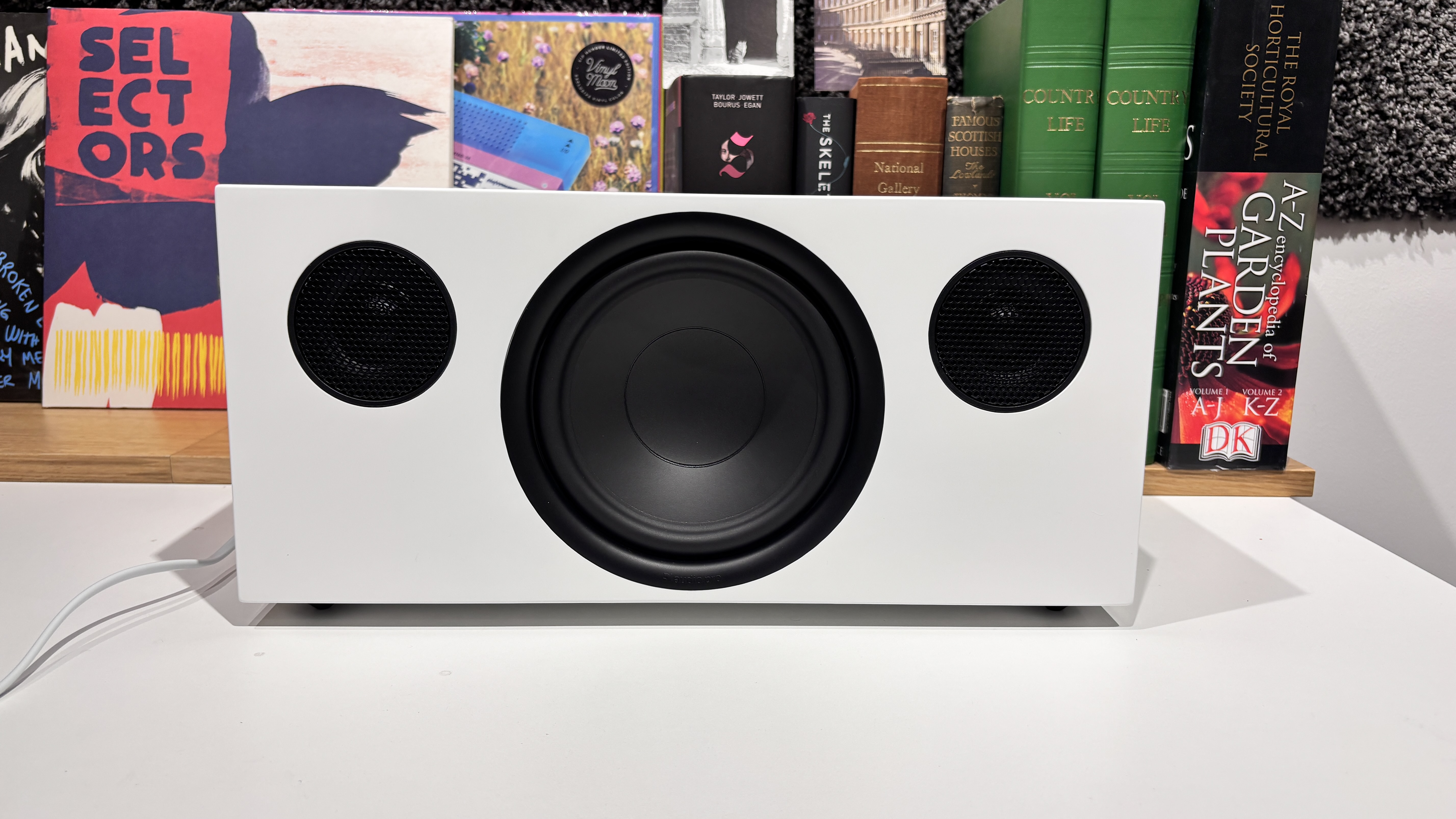
Specifications
Reasons to buy
Reasons to avoid
The Audio Pro C20 W acts as the replacement to the established, Award-winning C20, and while it doesn't look much different in person or on paper, subtle tweaks have raised a very fine speaker to new heights. It's a Bluetooth speaker by virtue of the fact that it offers Bluetooth 5.0 capabilities, but the C20 W is capable of doing so much more.
The headline addition a new app powered by LinkPlay, the company that owns WiiM. WiiM has forged part of its growing reputation on its user-friendly app, and we find the new platform for the C20 W (named the 'Audio Pro W' app) to be a comprehensive, manageable suite for getting the most out of your wireless speaker.
The sound has also been tweaked. It's not a massive change up, but the 'W' edition brings extra helpings of clarity and detail to a speaker that was hardly lacking in such departments. It's also a little fuller in the bass, while its built-in phono stage is a step up over the one found in the original C20.
Elsewhere, things are roughly the same as before, and that's no bad thing. The Audio Pro C20 W remains primarily a wireless speaker, with its wi-fi capabilities allowing it to stream tracks up to 24-bit/96kHz via AirPlay 2 and Google Cast, as well as through Spotify Connect, Tidal Connect and Audio Pro multi-room.
You also get a deep bag full of physical connections. The C20 W offers a batch of RCA inputs alongside HDMI ARC for boosting your TV's sound, plus a sub out if you're keen to add a subwoofer.
There's an optical input for getting tethered to digital sources, as well as a better-sounding MM phono stage if you plan on connecting up your turntable and building an impromptu deck-and-speaker hi-fi system.
Our review verdict gives it to you in a nutshell: "The excellent C20 W sees Audio Pro honing an already Award-winning recipe. In retaining the versatility of the original while adding boosts to usability and sonic performance, Audio Pro has elevated a great wireless speaker to new heights". Sold!
Read our full Audio Pro C20 W review
Also consider
JBL Go 4: Small, portable and super-affordable, we've always liked the JBL Go range of soap-sized speakers, even if we've had a few reservations about battery life and sonic oomph. Happily, the JBL Go 4 is the best Go speaker yet, with improved 7-hour battery life, impressive sonic capabilities and clever Auracast tech. It's a seriously impressive speaker considering its tiny size and meagre price of around £40 / $50 / AU$60.
Bowers & Wilkins Zeppelin Pro Edition: You'll probably use its hi-res wireless streaming capabilities more than Bluetooth 50, but it's worth including the Pro Edition here considering just how good it is. As an attractive, beautifully made entity that wows with its sound and style, this is possibly the best Zeppelin ever made.
JBL Flip 6: A great speaker at a (usually) great price, the Flip 6 prioritises sonic performance and a rugged, portable build. If you can't stretch to the Flip 7, it's well worth considering.
Bang & Olufsen Beosound A1 (3rd Gen): If you can look past its rather high price tag, the latest addition to the Beosound A1 line is a classy, beautifully made speaker that we can't help but covet. As a portable, money-no-object Bluetooth buddy to impress your friends at a swanky soiree, it really does have, if you'll excuse the phrase, the 'wow factor'.
JBL Charge 5: The Charge 5 is one of the best Bluetooth speakers we've tested in the last five years, so we'll be sad when it's no longer around. It's cheap as chips at the moment, and if you want a wi-fi version, the Charge 5 Wi-Fi isn't a bad shout, either.
Dali Katch G2: The beautiful Dali Katch G2 used to be a mainstay of this list before the Xtreme 4 came along and stole some of its thunder. It's still an utterly wonderful piece of kit though, melding gorgeous, refined looks with a sound profile that's, well, gorgeous and refined. Very much the thinking person's portable pal.
Bose SoundLink Max: We like the SoundLink Flex, but just feel that slightly sonically superior rivals have prevented us from a solid recommendation. The bigger, pricier SoundLink Max is a five-star belter, though, serving up a powerful, musical sound that really mixes it with the best of them.
Bose SoundLink Plus: Even if it couldn't quite nab the coveted five-star rating of its larger Max sibling, we have a real soft spot for the SoundLink Plus. It's nicely made, entertaining to listen to and made convenient by its portability. A few extra features wouldn't go amiss, mind.
How to choose the best Bluetooth speaker for you
Set a budget
When choosing a Bluetooth speaker, the first thing you should ask yourself after setting a budget is what you want from it. Does the speaker need to be portable and versatile enough to use both indoors and outdoors? Or are you happy with a mains-powered speaker that can fill a big room with brilliant audio?
Sound is king
Sound, of course, should play a huge part in your decision, because there's absolutely no guarantee that two models of a similar price will end up sounding the same in terms of quality, audio presentation and general timbre. Some Bluetooth speakers will be peppy and exciting, while others will prioritise pulsating bass to get the party started.
Volume and power matter
Size and power, too, should be a consideration. The Tribit Micro 2 is a handy little speaker to take into the shower or clip onto your rucksack during a hike, but you'll find it practically useless if you plan to rave away your nights to the sound of the best house, dance and electronic floor-fillers every weekend. A bigger option, like the JBL Charge 6, or models that allow daisy-chaining, will be more appropriate for ravers or users who prioritise loudness.
Portability adds convenience
If you're choosing portability, you'll want to think about battery life and other aspects such as how waterproof, dustproof and rugged the design is. How durable a Bluetooth speaker is can quickly become a determining factor, especially if you want to, say, take one to the park or the beach and on holidays. Check out our IP ratings explainer if you're unsure.
What about features?
Generally, the more you spend the more features you get, such as multi-room functionality, higher-quality Bluetooth codec support (for aptX or aptX HD, for example), and the ability to answer calls hands-free. Some portable Bluetooth speakers even allow you to charge a smartphone or tablet using their own built-in battery. Naturally, you should only consider treating a buying decision as a box-ticking exercise based on the features you think you'd benefit from.
Make a list
Once you've narrowed down your search, it's time to draw up a shortlist of contenders and, if you have the time, search around a few retailers and outlets for the best price. Or, alternatively, you can use our best Bluetooth speaker deals hub to find discounts right away.
How we test Bluetooth speakers
At What Hi-Fi? we review hundreds of products every year at our state-of-the-art testing facilities in London and Reading. We have complete control over the testing process, and we also review products as a team as opposed to individually, ensuring no opinion goes unheard and that our final verdicts are consistent. Our expert, trusted team has over 100 combined years of reviewing experience.
Besides the sound quality of a Bluetooth speaker, which we test with every genre of music from classical to pop, we also scrutinise other aspects of its design. These include its battery life, the robustness of its Bluetooth connection, how easy it is to use and set up, and finally, how well built and rugged it is – especially if it will be used outdoors.
Our review philosophy doesn't change whether we're evaluating a portable budget Bluetooth speaker or a more premium model with extra streaming features.
All Bluetooth speakers are judged on a performance-per-pound basis and, as part of our tried-and-tested process, put up against the current class leader(s) at its respective price point to see how they compare and to help us settle on a star rating.
There's no input from PR companies or our sales team when it comes to the verdict, with What Hi-Fi? proud of having delivered honest, unbiased reviews for nearly five decades.
Read more about how we test products at What Hi-Fi? here.
FAQ
How do you connect multiple Bluetooth speakers?
It is possible to daisy chain multiple Bluetooth speakers, but it depends on the make and model of the speakers you're using.
Connecting them wirelessly will help spread the sound over a wider area, creating a louder, more immersive soundscape. Speakers supporting this feature include those from JBL and Ultimate Ears.
But be warned: not all speakers from those brands will be supported, and some newer models won't be compatible with older ones, so check with the manufacturer before you buy.
What are the top rated home Bluetooth speakers?
All Bluetooth speakers work in the home, but if you want one that's mains-powered and designed solely for indoor use, we have three great options for you.
The Sonos Era 100 is a multi-room speaker that works over wi-fi, but also has Bluetooth onboard. It fits seamlessly into a Sonos multi-room system, but the addition of Bluetooth makes it more versatile than most home speakers.
We rate the Audio Pro C20 W as the best premium Bluetooth speaker that's great for music and movies. It's very much a home speaker, with a sound quality befitting a home cinema setup.
The Amazon Echo Dot (5th Gen) is much cheaper than both of the above, and has Amazon's Alexa assistant at your beck and call. It's our pick for best smart Bluetooth speaker.
Can you hook up Bluetooth speakers to a MacBook Pro?
Yes, you can. Apple's MacBook laptops have Bluetooth, so connecting a Bluetooth speaker to one is a very simple process.
First, switch on your Bluetooth speaker and set it in pairing mode (this usually involves holding down a button, but your speaker's instructions will be able to tell you). Click the Bluetooth symbol at the top of your MacBook's screen, and select your speaker from the dropdown menu.
You should hear a chime to indicate that pairing was successful. Then whatever audio plays on your MacBook Pro will come through the Bluetooth speaker.
Wireless speakers: what's best, Bluetooth vs wi-fi?
The beauty of a Bluetooth speaker is that you can take it with you wherever you go: to the park, the beach, a barbecue... Wi-fi speakers, on the other hand, need a wi-fi connection, and so are designed to remain in the home.
Wi-fi speakers usually aren't designed to withstand the elements, as you don't need water- or dust-proofing for a home device. They can also join with other speakers on the same wireless network to create a multiroom setup. And they usually sound better than Bluetooth speakers.
Some multiroom speakers have Bluetooth as well, making them more versatile. But they're usually still made to be used solely in the home.
What are the top waterproof Bluetooth speakers?
Bluetooth speakers are usually designed to be taken out and about, so most of them offer a decent degree of waterproofing.
The JBL Charge 6 is our pick as the best model for most people – it's a fantastic all-rounder. If you want a slightly smaller, cheaper model, the JBL Flip 7 is your best option, while the Bose SoundLink Max is the best premium model.
You can read more in our guide to the best outdoor speakers, and find our how waterproof a speaker is with our guide to IP ratings.
What's the difference between wireless and Bluetooth speakers?
Bluetooth speakers are wireless in that they don't require a wire to connect to an audio source; they use the Bluetooth streaming protocol. However, Bluetooth speakers don't necessarily also support wi-fi, which is a necessary feature of what we term 'wireless speakers'.
A wireless speaker can connect to an audio source via the internet (i.e. your home wi-fi) – by way of Apple AirPlay or Google Chromecast, for example – whether or not it also has Bluetooth.
While this will depend on the kit you are using and your wi-fi limitations at home, transmitting audio over wi-fi rather than Bluetooth comes with certain benefits: wi-fi doesn't have as limited a signal range as Bluetooth, generally facilitates better sound quality and is capable of transmitting higher-quality audio.
The standard Bluetooth codecs (SBC and AAC) are not widely capable of transmitting CD-quality (or higher) files, and even the higher-quality codecs like aptX are lossy (i.e. data gets lost during the transmission).
However, Bluetooth-only speakers are generally more portable, as they don't require an internet connection or being plugged into the mains power, and often more affordable than wi-fi-enabled wireless speakers. If you're interested in wi-fi-ready speakers, you should look at our best wireless speakers guide instead.
It's also worth noting which "version" of Bluetooth is being utilised. Most models are using a version from 5.0 or beyond, with each subsequent iteration – 5.1, 5.2 etc. – generally leading to improvements in stability, range and even transmission rates, although the specific changes vary from version to version.
How many watts is good for a home Bluetooth speaker?
There isn't a simple answer here, as a higher wattage number doesn't necessarily equal good sound quality, but it does determine how loud your speaker can go. Basically, you'll want a speaker that's going to be able to fill your intended space with a good amount of sound.
So, if you're looking for a small, portable Bluetooth speaker to use casually on the table in a small space, a relatively low-powered speaker output (10W or thereabouts) will get that job done for you without any problems.
However, if you've got a big, spacious room or the outdoors that you want to fill with sound at decent volumes, a bigger speaker with a higher watt output (25W to 50W) will likely serve you best.
How does a Bluetooth speaker work?
Bluetooth is a short-range, low-powered, low-bandwidth streaming protocol used to connect compatible devices together wirelessly. Bluetooth uses radio waves just like wi-fi does but at a different scale.
A Bluetooth speaker relies on this short-range Bluetooth connection to connect to a Bluetooth-supporting audio source and accept audio data from it. Both the speaker and source device need to have compatible Bluetooth codecs to send this information between them – SBC and AAC are the standard codecs.
A wireless speaker operates similarly but instead relies on a wi-fi network connection to accept audio data transmitted from an audio source.
Pairing a Bluetooth speaker and Bluetooth device is easy: you simply put the speaker in 'pairing mode' (usually by pressing a button), go into a device's Bluetooth settings and 'scan' for available speakers and then select your speaker.
Is JBL a good brand? Better than Bose?
At What Hi-Fi?, we have reviewed many products from both JBL and Bose and find that many of JBL's current speakers provide excellent audio quality and great value, earning them many five-star reviews.
Bose speakers tend to satisfy on the features and design front, and while we used to see budget and great-sounding speakers from Bose a few years ago, recent models have seen costs rise. These pricier models don't always offer the same performance-per-pound value as their rivals.
In the audio world, it is tough to compare how good one brand is to another on the whole, especially when it comes to big brands that have many products in their arsenal. While we do recommend a fair few JBL speakers on the above list, don't assume that everything JBL makes is better than everything Bose makes.
Recent updates
- January 2026: No new additions, but we're looking ahead to some of the exciting Bluetooth speakers that could be arriving in 2026.
- December 2025: No new entries but kept our copy up-to-date for the start of 2026.
- November 2025: We've updated our copy to reflect recent reviews and Awards.
- October 2025: Replaced the outgoing Audio Pro C20 with the C20 W as our favourite premium entry.
- September 2025: Expanded FAQ section with new entries.
- September 2025: Included references to newly-unveiled speakers such as the JBL Grip.
- August 2025: Added the recently reviewed Bose SoundLink Plus to our also consider section.
- July 2025: Included references to upcoming speakers such as the Bose SoundLink Plus.
- June 2025: We've added the Bang & Olufsen Beosound A1 (3rd Gen) to our also consider section following its recent four-star review.
- May 2025: Made sure our copy is up to date and added references to potentially upcoming speakers.
- April 2025: Added the JBL Flip 7 and Charge 6 to our main list and dropped the Flip 6 and Charge 5 into our also consider section.
- March 2025: Provided an update on the JBL Flip 7 and Charge 6 and added the Bowers & Wilkins Zeppelin Pro Edition to our also consider section.
- February 2025: No new updates but refreshed copy to keep it up to date with current market information and rumours.
- January 2025: Added the Sony LinkBuds Speaker to our also consider section.
- December 2024: Added references to our recent Awards and refreshed some copy to keep it up to date.
- October 2024: Gave the JBL Xtreme 4 and the Audio Pro C20 new straplines to reflect their What Hi-Fi? 2024 Award wins.
- September 2024: Added the JBL Go 4 to our also consider section following a five-star review.
- August 2024: The new five-star JBL Xtreme 4 speaker has been added to our main list, replacing the Dali Katch G2 (which is still a firm recommendation in the also consider section).
- July 2024: Added five-star Bose SoundLink Max to the also consider section and referred to new or upcoming Bluetooth models in the intro.
- April 2024: Added the Audio Pro C20 following a five-star review.
- March 2024: Added an also consider section to offer more alternative buying options for readers.
MORE:
Planning on a pool party? These are the best outdoor speakers
For an alternative to Bluetooth, here are the best wireless speakers
Adventurers will also need the best running headphones and wireless earbuds
The latest hi-fi, home cinema and tech news, reviews, buying advice and deals, direct to your inbox.

Harry McKerrell is a senior staff writer at What Hi-Fi?. During his time at the publication, he has written countless news stories alongside features, advice and reviews of products ranging from floorstanding speakers and music streamers to over-ear headphones, wireless earbuds and portable DACs. He has covered launches from hi-fi and consumer tech brands, and major industry events including IFA, High End Munich and, of course, the Bristol Hi-Fi Show. When not at work he can be found playing hockey, practising the piano or trying to pet strangers' dogs.
